Creating a well-organized and inspiring sewing room transforms your crafting experience from chaotic to delightful. Whether you have a dedicated room or just a corner of your home, smart design choices can maximize functionality while reflecting your personal style. The perfect sewing space combines efficient storage solutions with comfortable work areas, proper lighting, and organizational systems that keep supplies accessible yet tidy. From compact pegboard displays to spacious cutting tables, every element should work together to support your creative process. These thoughtful design ideas will help you create a sewing sanctuary that enhances productivity, sparks inspiration, and makes every project more enjoyable to complete.
1. Pegboard Wall Organization Systems
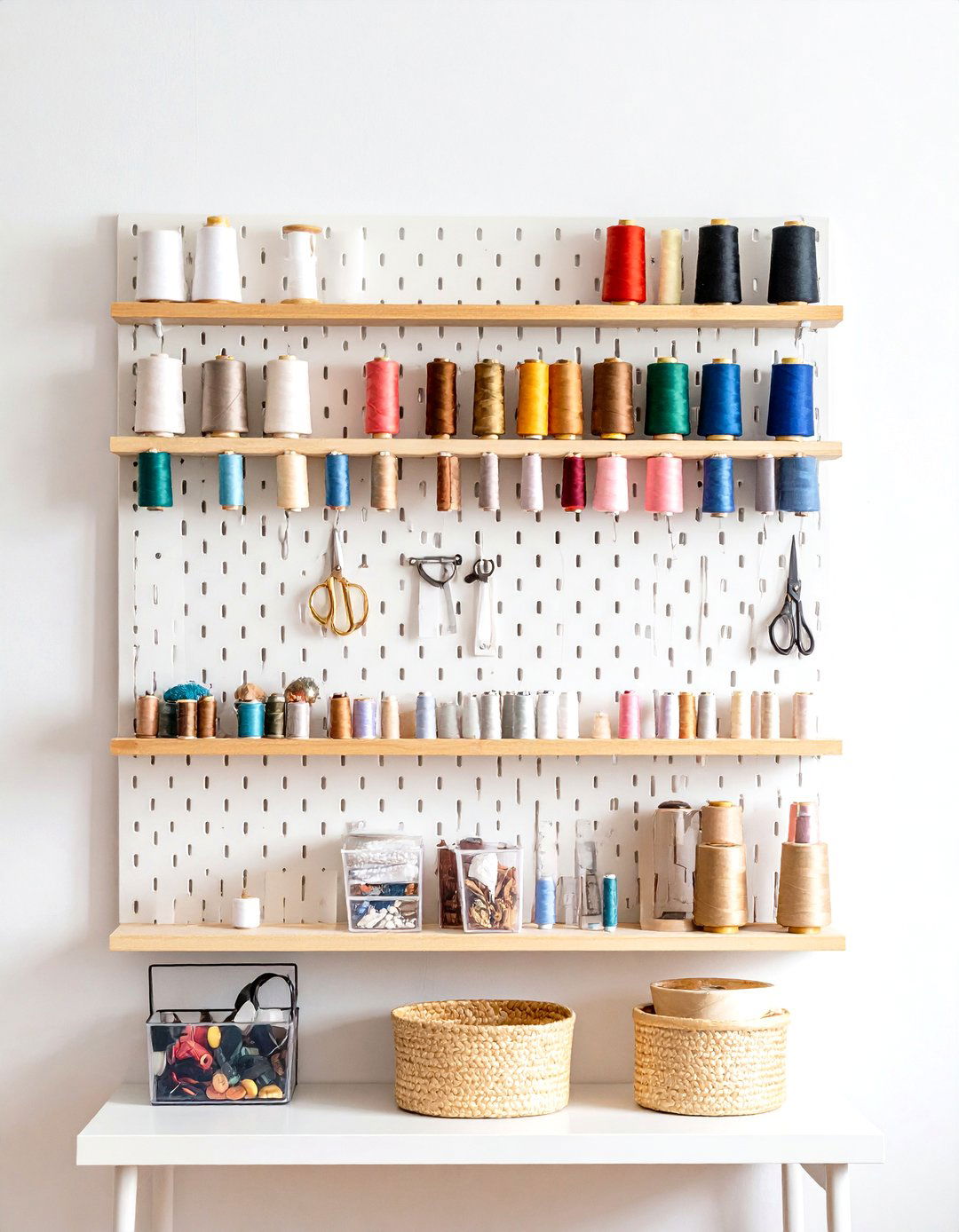
What if every tool you need could be within arm's reach while maintaining a clean, organized workspace? Pegboard systems offer the ultimate in customizable storage for sewing rooms. Mount a large pegboard on your wall and use hooks, baskets, and shelves to display thread spools, scissors, rulers, and rotary cutters. The beauty lies in its flexibility - you can rearrange accessories as your needs change. Clear containers attached to pegboard hooks keep small notions visible and organized. This vertical storage solution maximizes wall space while creating an attractive display of your sewing supplies that's both functional and visually appealing.
2. Rolling Storage Cart Stations
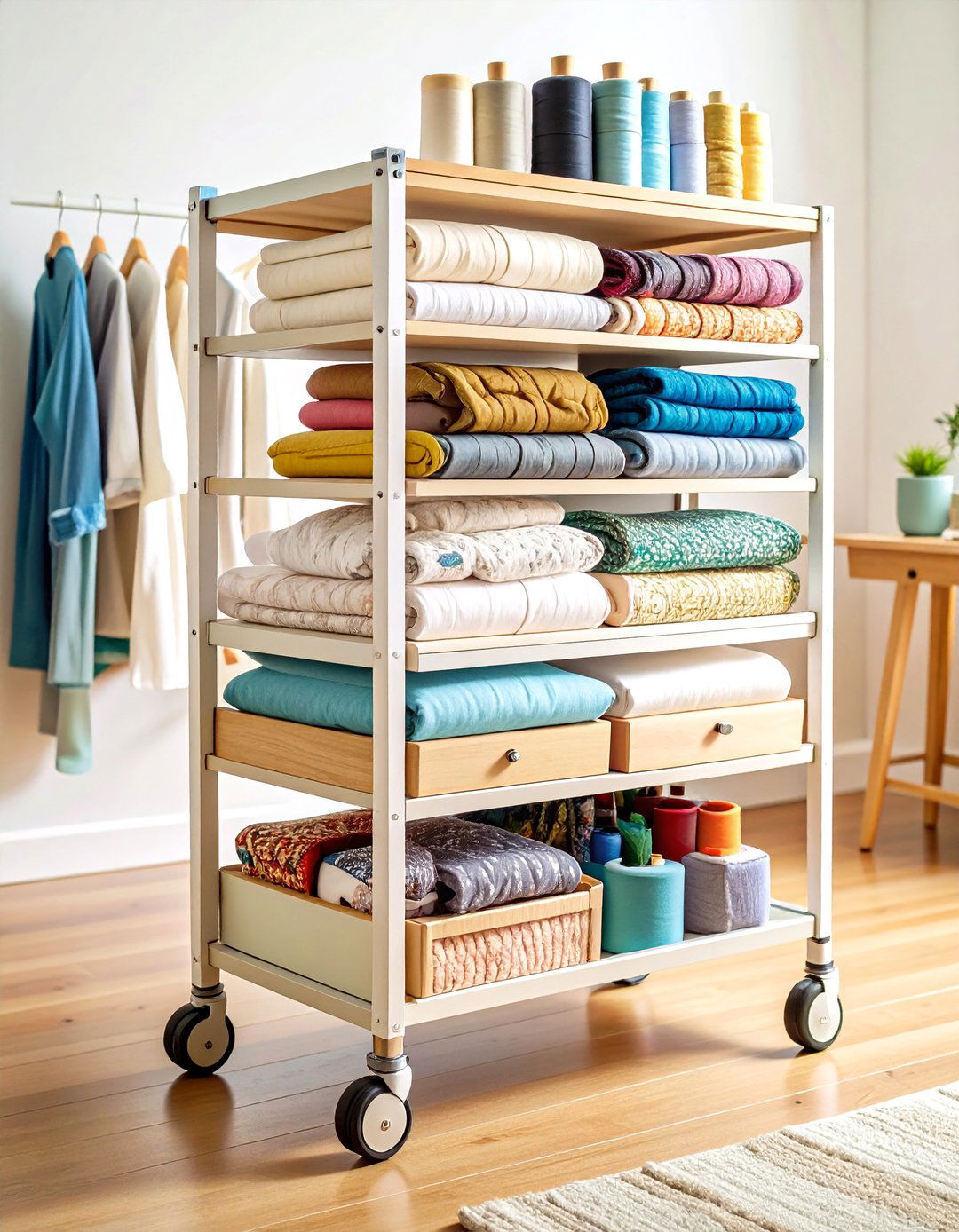
Does your sewing space need mobile organization that adapts to different projects? Rolling storage carts provide flexible solutions for organizing supplies while maintaining workspace mobility. These multi-tiered carts can hold fabric, thread, patterns, and tools, rolling wherever you need them most. Park them beside your sewing machine during active projects, then wheel them away for storage. Many feature removable bins or drawers for easy sorting. Choose carts with different sized compartments to accommodate various supplies from tiny buttons to large fabric pieces. The mobility factor makes these perfect for shared spaces or when you need to clear the room for other activities.
3. Dedicated Cutting Table Design
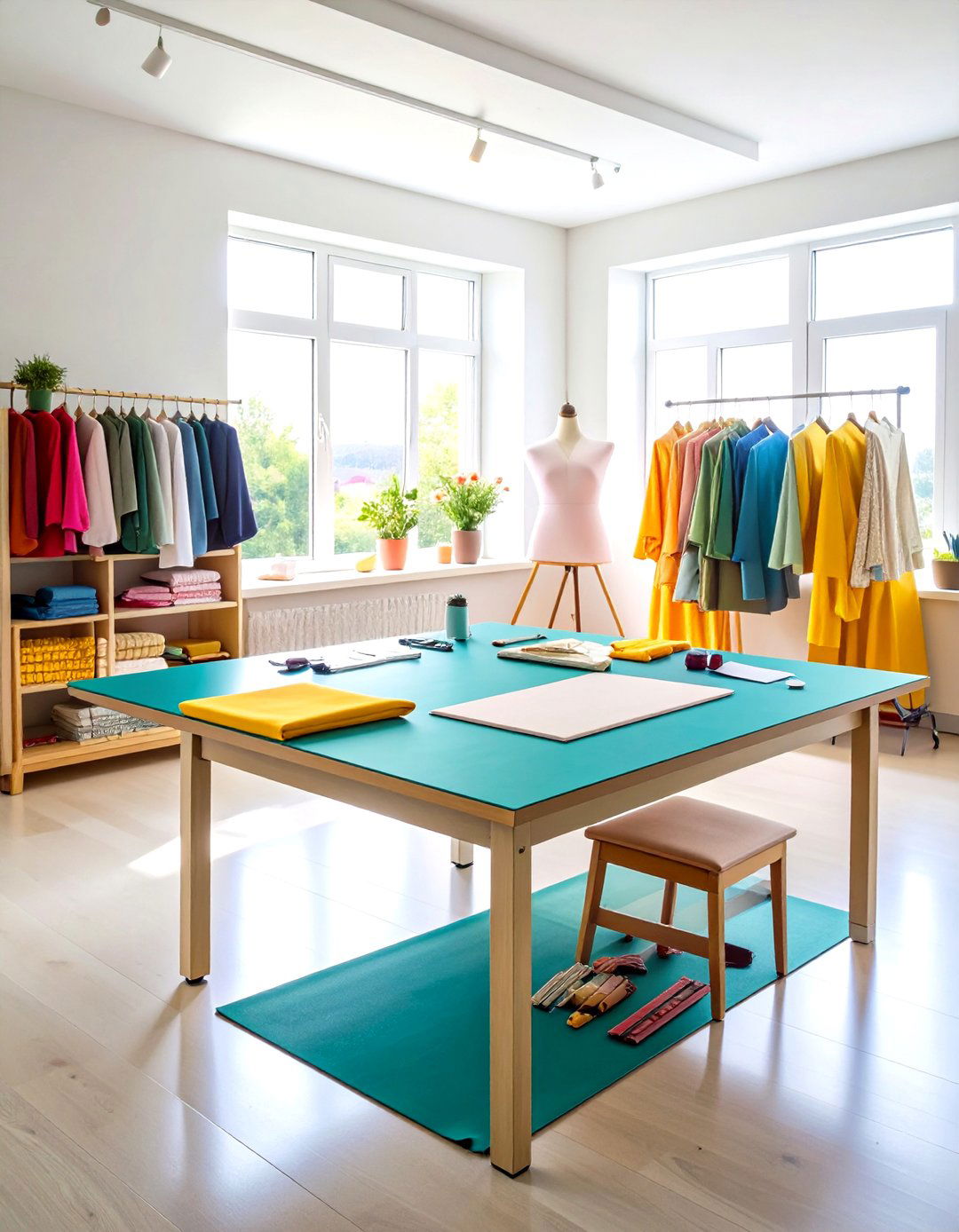
Why struggle with dining table cutting when you could have a professional-grade workspace? A proper cutting table stands at the ideal height to prevent back strain while providing ample surface area for laying out patterns and fabric. Build or purchase a table around 36 inches high with storage underneath for cutting mats, rulers, and fabric bolts. Many sewers create custom versions using kitchen cabinets as a base with a large plywood top. Add wheels for mobility or keep it stationary with organized storage cubbies below. The investment in proper cutting height dramatically improves accuracy and comfort during long cutting sessions.
4. Professional Ironing Station Setup
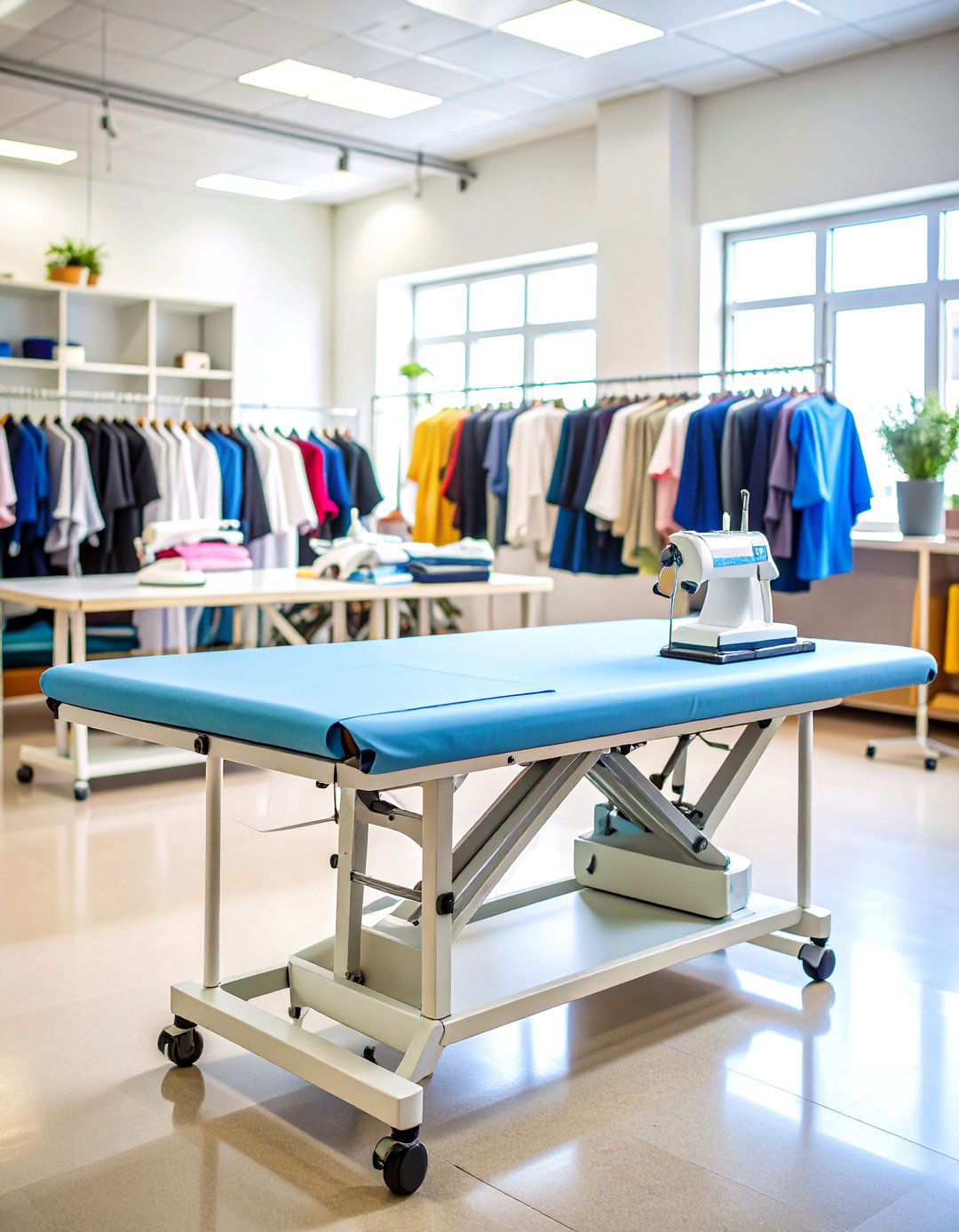
Could a dedicated pressing area transform the quality of your finished projects? Professional ironing stations elevate your sewing results while providing ergonomic comfort. Position your ironing surface at the proper height near your sewing machine for easy access between seam pressing. Many sewers create custom ironing tables using plywood topped with batting and canvas, offering more stability than traditional ironing boards. Include storage nearby for pressing cloths, starch, and specialized pressing tools. Consider a gravity-feed iron system for consistent steam. The proximity to your main workspace encourages proper pressing habits that significantly improve the professional appearance of your garments.
5. Thread Display and Storage Solutions
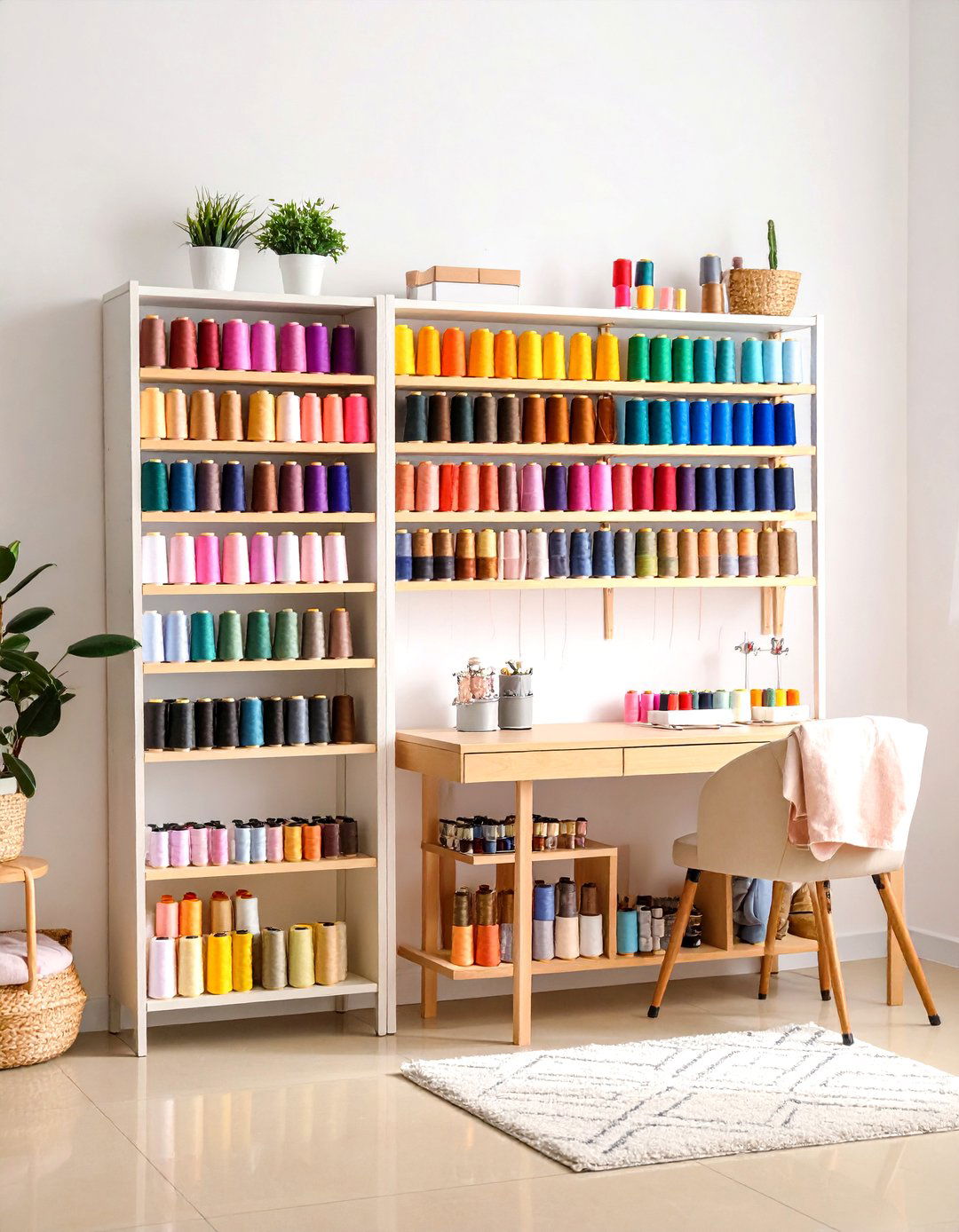
Are you tired of digging through boxes to find the perfect thread color? Elegant thread storage systems keep spools organized while creating beautiful room displays. Wall-mounted thread racks showcase your collection like an art installation while maintaining easy access. Choose from wooden racks, clear acrylic holders, or vintage-style displays that complement your room's aesthetic. Organize threads by color family or weight for quick selection. Include coordinating bobbin storage nearby to keep wound bobbins with their matching threads. Consider illuminated displays that highlight thread colors accurately. This organized approach saves time during projects and prevents purchasing duplicate colors.
6. Fabric Storage Cabinet Systems
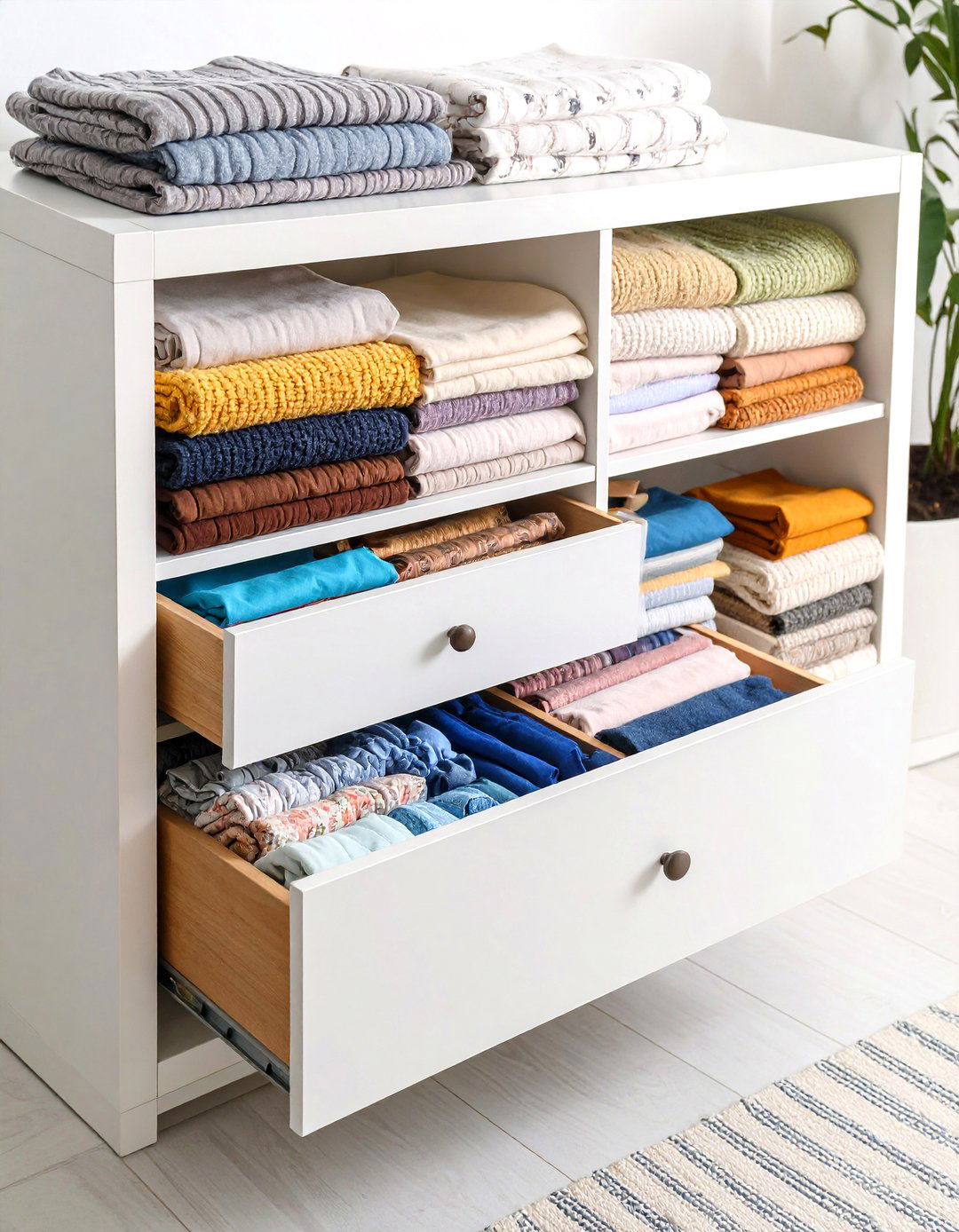
What's the secret to keeping extensive fabric collections organized and accessible? Systematic fabric storage prevents overwhelm while protecting your investment in beautiful textiles. Deep drawer systems work perfectly for folded yardage, allowing you to see fabric choices at a glance. Install adjustable shelving for varied fabric heights and use clear bins for smaller pieces. Label storage areas by fabric type, weight, or project destination. Consider climate-controlled storage for delicate or valuable fabrics. Roll fabrics around cardboard bolts for wrinkle-free storage of longer pieces. Organized fabric storage inspires creativity by making it easy to envision project possibilities when browsing your collection.
7. Small Space Corner Workstations
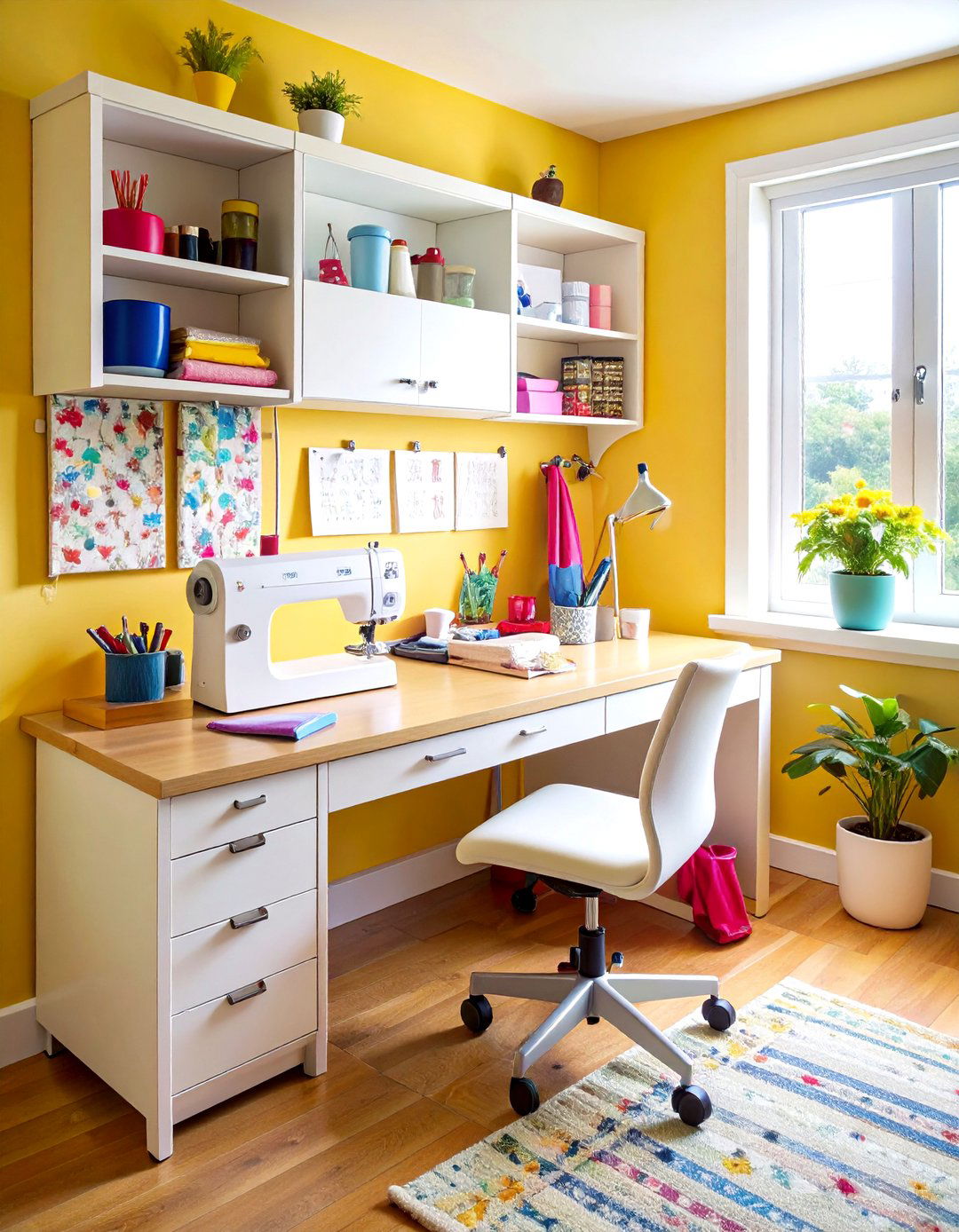
How can you create an efficient sewing area in just a few square feet? Corner workstations maximize limited space by utilizing often-overlooked areas. Install a corner desk that fits snugly into available space, with storage above and below. Wall-mounted organizers keep supplies within reach without cluttering the work surface. Choose furniture with dual purposes, like ottoman storage or drop-leaf tables that expand when needed. Vertical storage becomes crucial in small spaces - use every inch of wall height for shelving and hanging storage. Good lighting is essential in compact areas, so invest in adjustable task lighting that illuminates your workspace effectively.
8. Design Wall for Project Planning
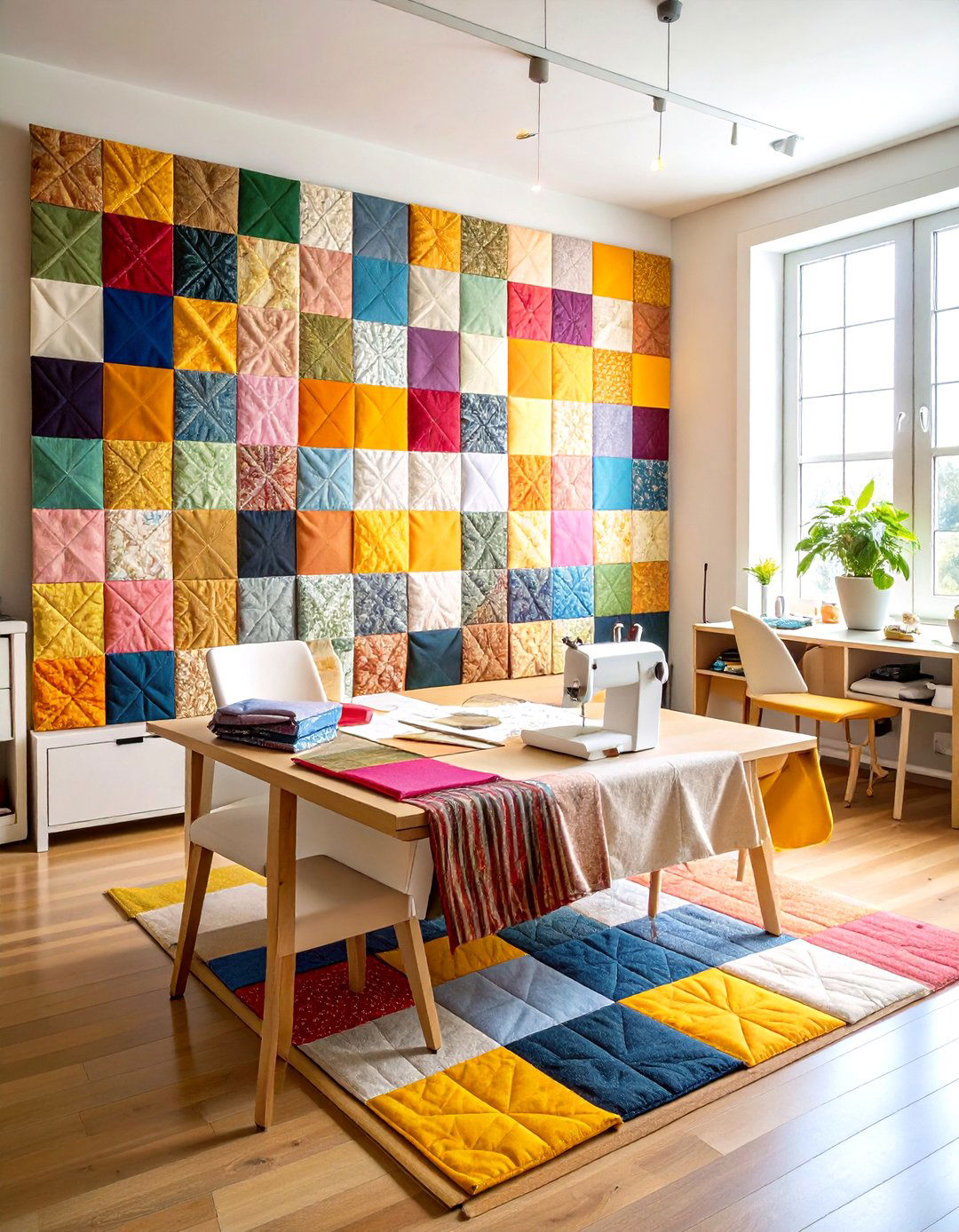
Why guess how quilt blocks will look together when you can see the complete design develop? Design walls provide essential space for arranging and visualizing projects before final assembly. Create a design wall using flannel fabric stretched over a large frame or foam board. Position it where you can step back and evaluate your work from different distances. Some sewers use felt or batting attached directly to the wall for a more permanent solution. Include good lighting that accurately shows fabric colors and contrasts. Mobile design walls on wheels work well in smaller spaces, allowing you to move the display as needed while maintaining project visibility.
9. Multi-Purpose Guest Room Integration
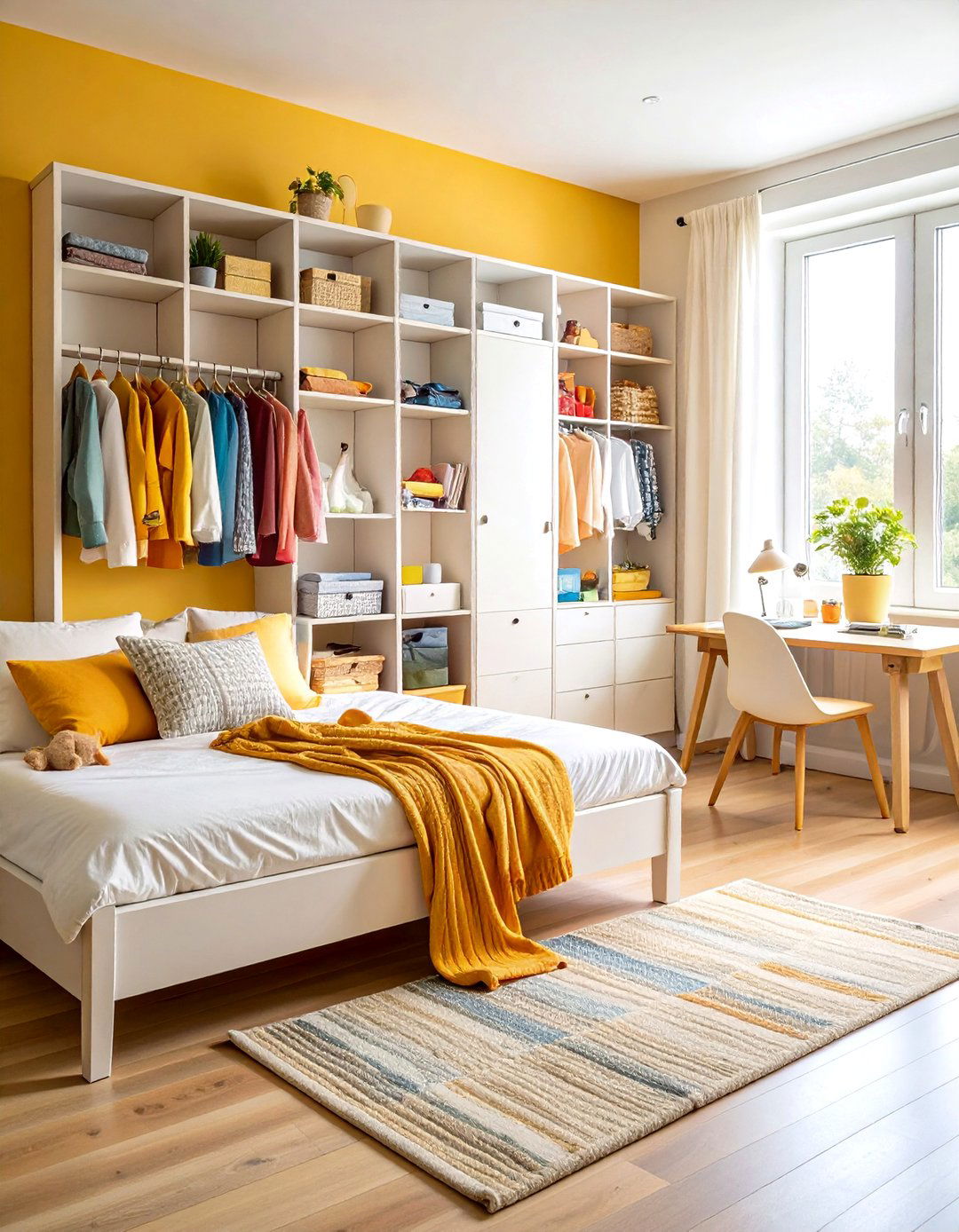
Can one room successfully serve both sewing needs and guest accommodations? Thoughtful planning makes dual-purpose rooms highly functional for both uses. Choose furniture that serves multiple roles, like a daybed with storage underneath or a folding cutting table that disappears when guests arrive. Install closed storage systems that hide sewing supplies while maintaining easy access for projects. Consider a sewing cabinet that closes completely, keeping machines and supplies out of sight. Wall-mounted storage keeps supplies organized without cluttering floor space needed for guest comfort. The key lies in creating systems that allow quick transitions between sewing workspace and welcoming guest room.
10. Vintage Sewing Cabinet Restoration
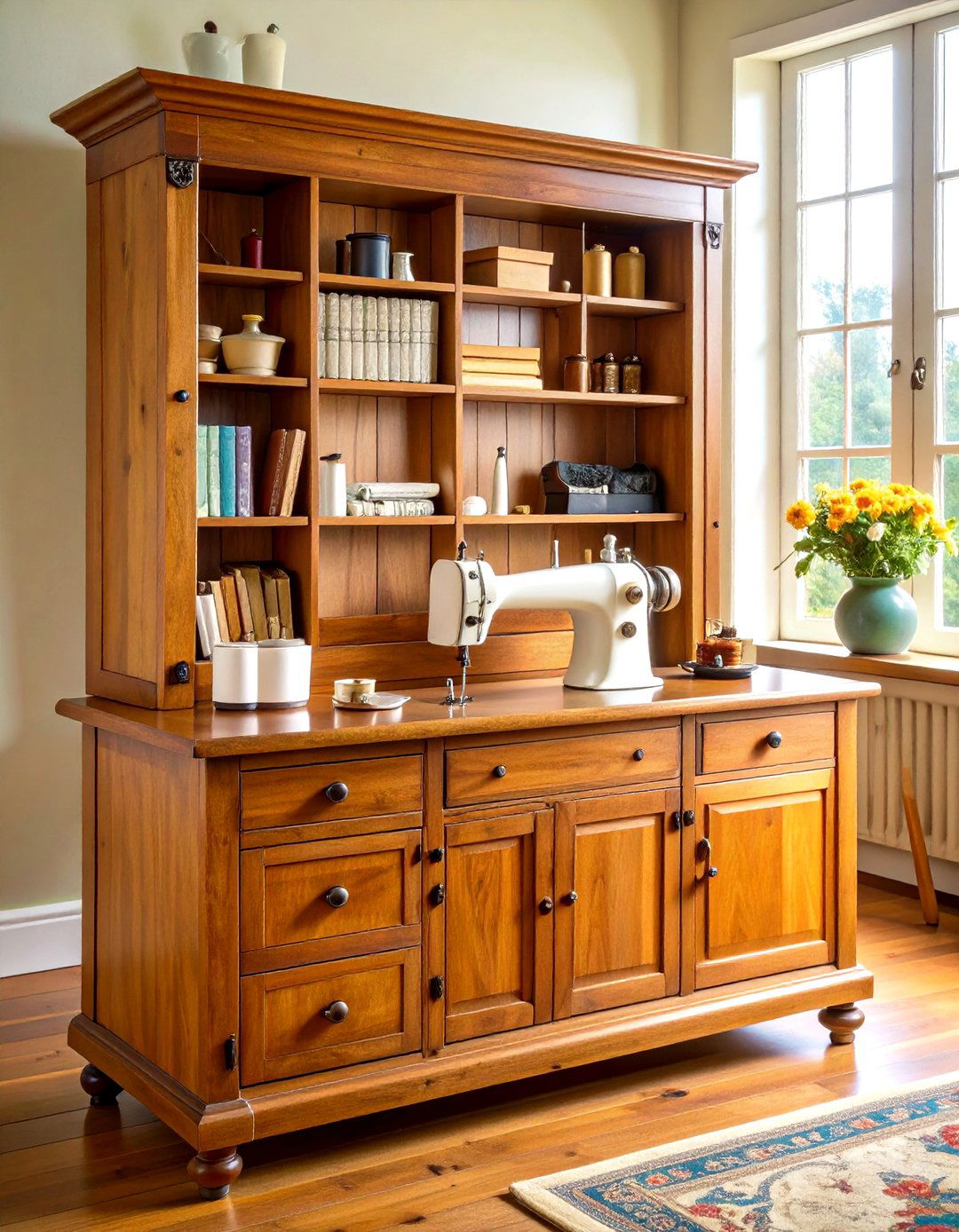
What treasures hide within grandmother's old sewing cabinet waiting for new life? Restored vintage sewing cabinets combine nostalgic charm with practical modern storage needs. Hunt for solid wood cabinets at estate sales or antique shops, focusing on good bones rather than perfect condition. Strip and refinish wood surfaces to reveal beautiful grain patterns beneath old paint or stain. Update hardware with period-appropriate pieces or modern alternatives that complement the vintage style. Retrofit interior spaces with modern organizers while preserving original character details. These restored pieces become stunning focal points that celebrate sewing heritage while providing excellent contemporary storage solutions.
11. Adjustable Height Work Surfaces
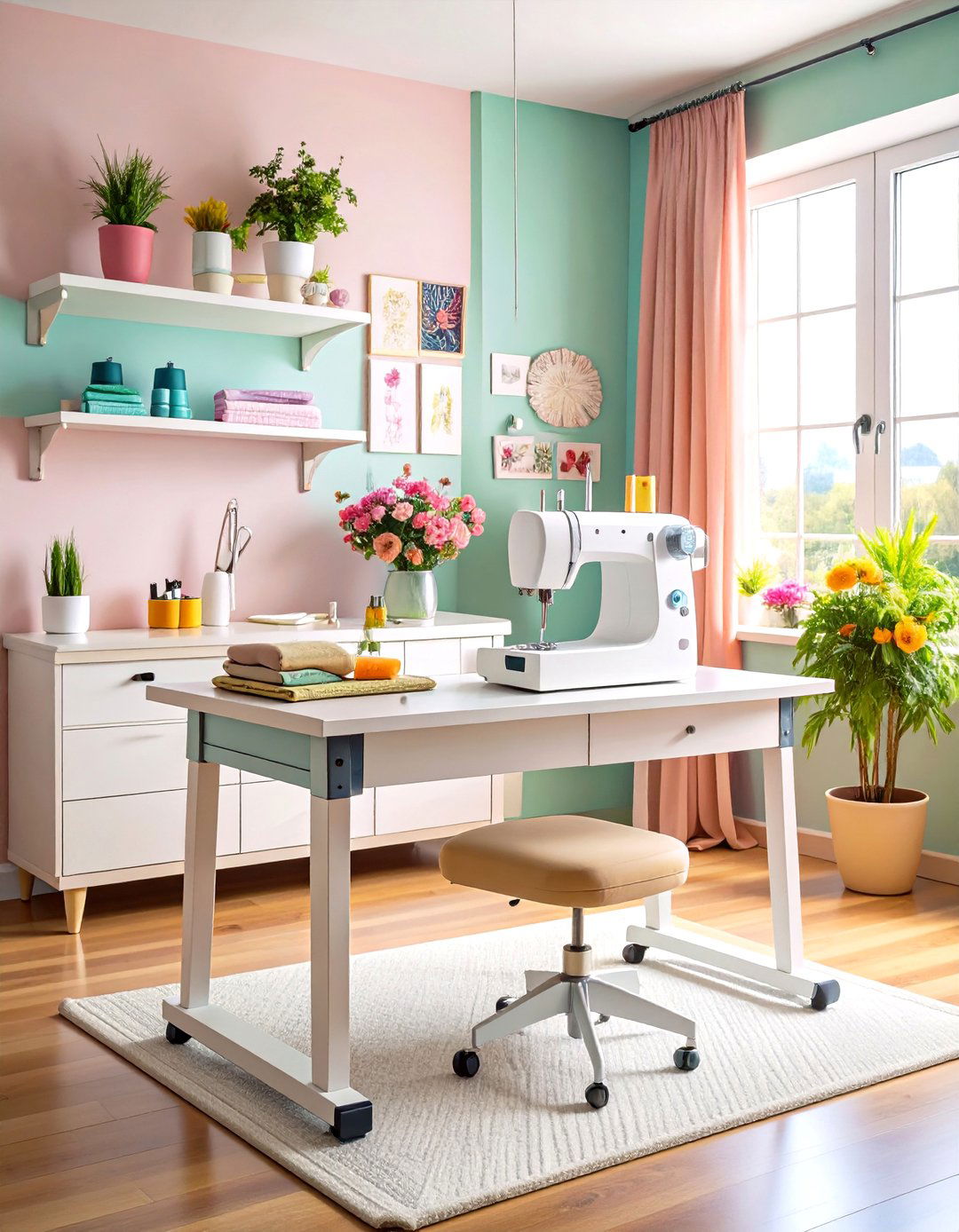
Does switching between sitting and standing work positions sound appealing for longer sewing sessions? Adjustable height surfaces accommodate different tasks and personal preferences throughout the day. Invest in adjustable-height sewing tables that move from sitting to standing positions easily. This flexibility reduces fatigue and improves posture during extended crafting sessions. Consider dual-height workstations with one surface for detailed machine work and another for cutting or layout tasks. Pneumatic or crank-operated mechanisms provide smooth height adjustments. Standing work reduces back strain while sitting positions offer precision for detailed work. This ergonomic approach makes sewing more comfortable and sustainable for longer periods.
12. Built-In Storage Solutions
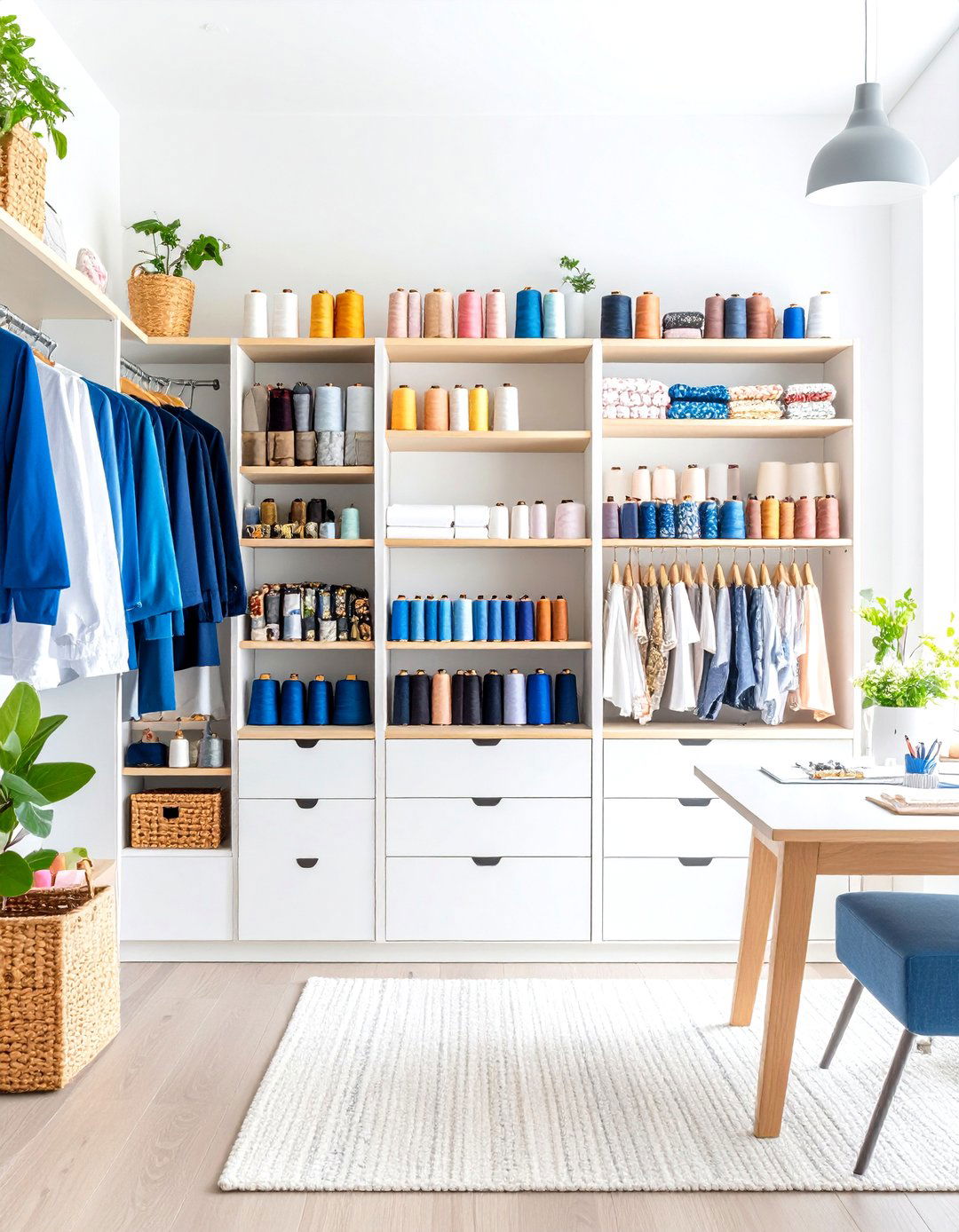
Why settle for furniture that almost fits when custom built-ins maximize every inch? Built-in storage solutions create seamless integration with your room's architecture while providing exactly the storage you need. Design custom cubbies that fit fabric bolt widths perfectly or create specialized compartments for different supply categories. Built-ins can incorporate unique features like pull-out cutting surfaces, hidden ironing boards, or specialized thread storage. Work with available space constraints like slanted ceilings or awkward corners to create storage that maximizes difficult areas. While requiring larger investment, built-ins provide long-term value and create a polished, professional appearance that standard furniture cannot match.
13. Mobile Project Organization
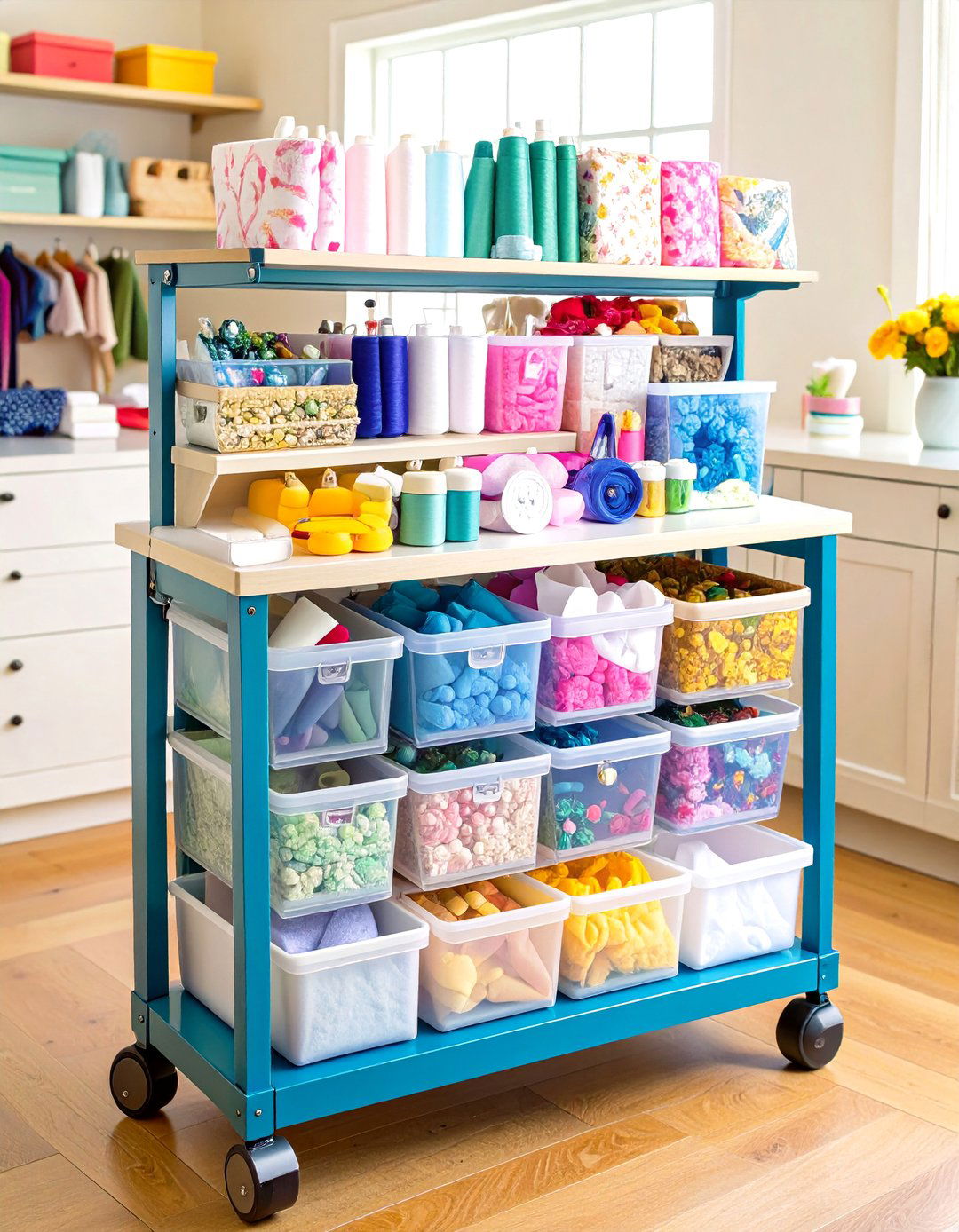
Are you constantly searching for pattern pieces and project supplies scattered across your workspace? Mobile project organization keeps everything for current work contained and portable. Use large zippered bags or project boxes to keep all materials for each project together - fabric, pattern, thread, notions, and instructions. Rolling carts dedicated to works-in-progress allow easy transport between cutting, sewing, and pressing areas. Clear storage containers let you see project contents at a glance. Label each container with project details and completion goals. This system prevents mixing up pieces from different projects while keeping your main workspace clear for active sewing tasks.
14. Specialized Lighting Design
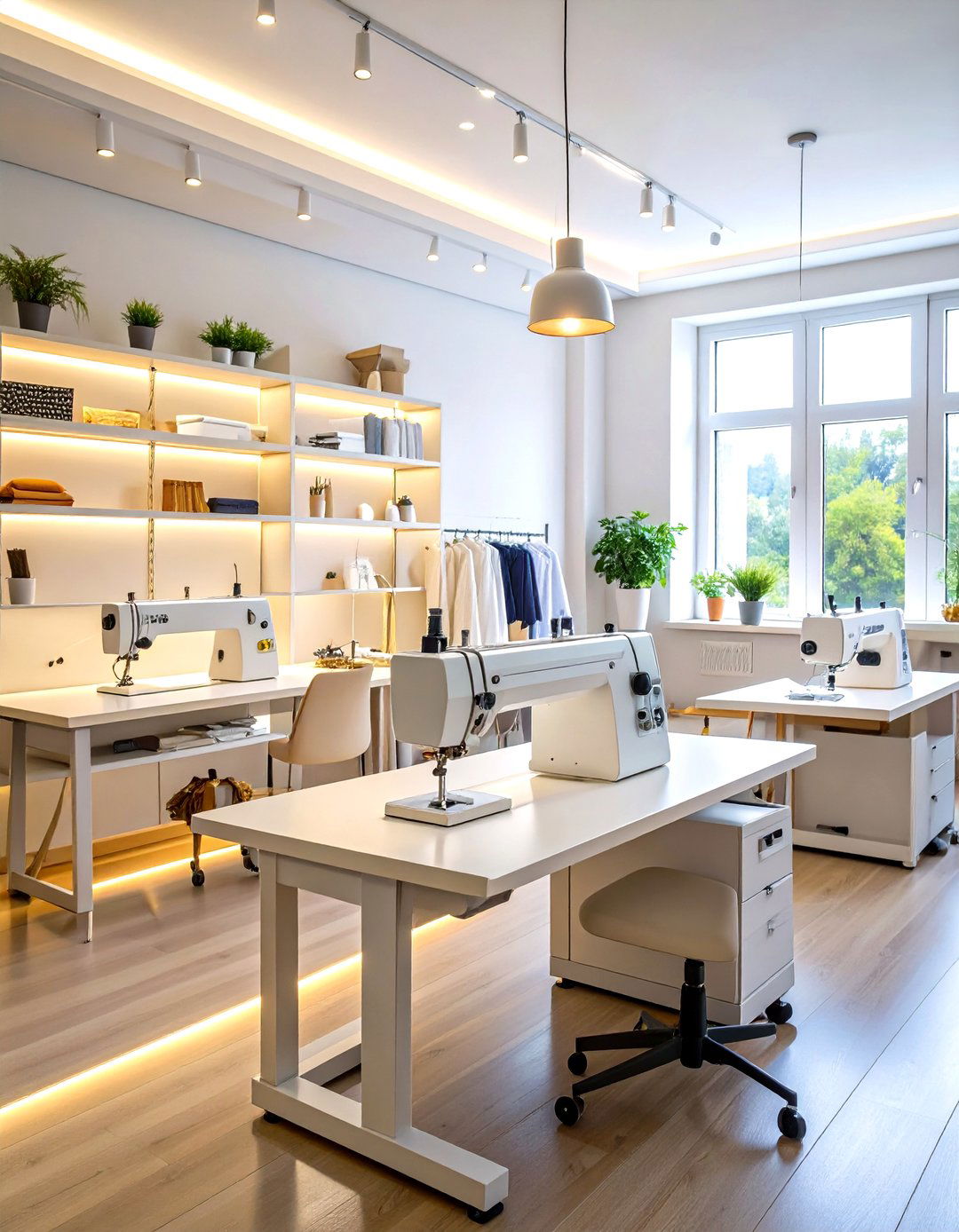
Could proper lighting be the missing element that transforms your sewing experience? Strategic lighting design eliminates shadows and reduces eye strain while improving accuracy. Combine natural light from windows with adjustable task lighting positioned directly over work areas. LED strip lights under shelves illuminate storage areas without creating glare. Position adjustable desk lamps beside sewing machines for shadowless detail work. Consider color-temperature adjustable bulbs that provide bright white light for precision tasks and warmer tones for relaxed creating. Good lighting makes fabric colors appear accurate and prevents mistakes caused by poor visibility. Invest in quality lighting systems that make sewing enjoyable at any time of day.
15. Notion Organization Centers
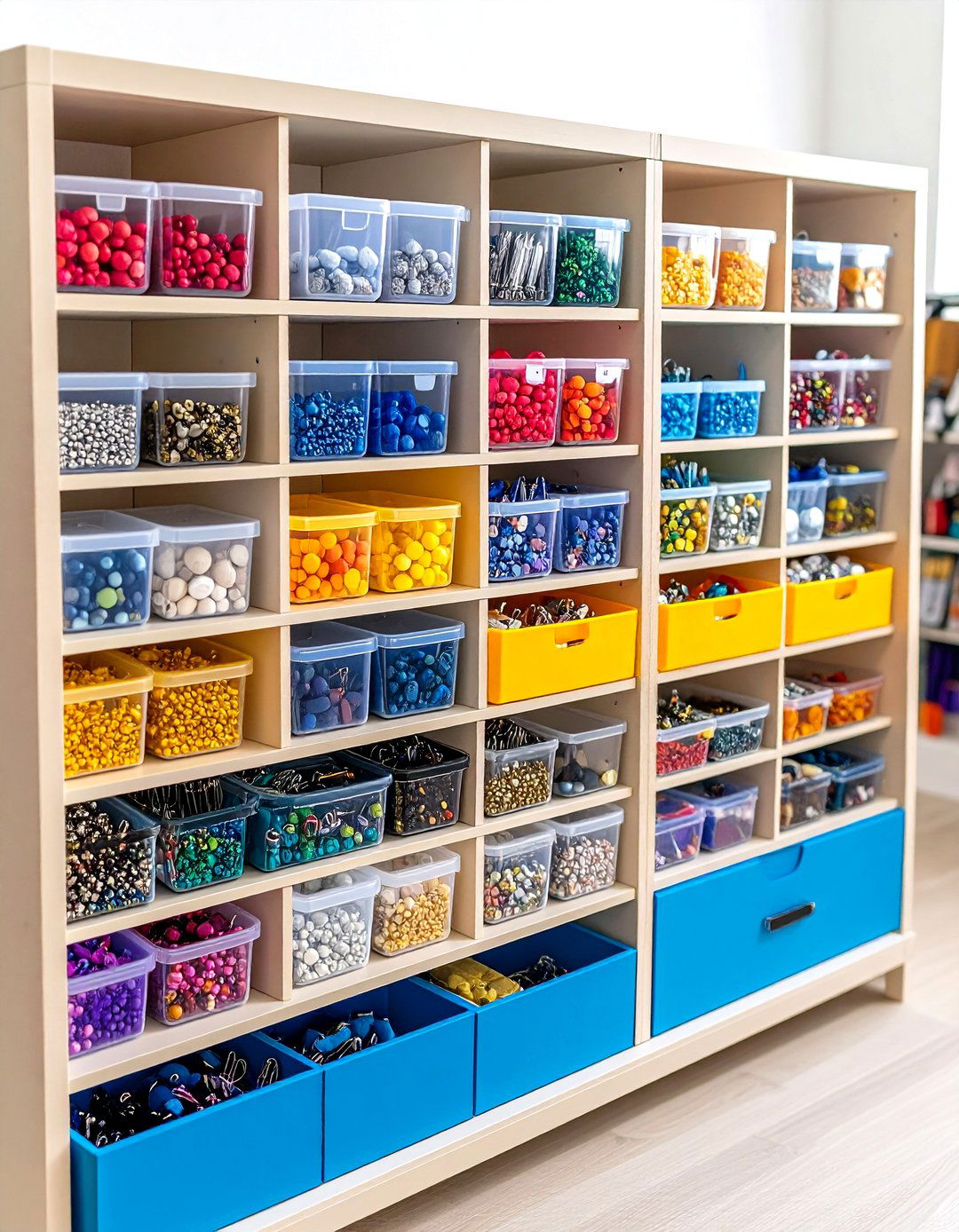
What if finding the perfect button or zipper took seconds instead of minutes? Organized notion storage transforms frustrating searches into quick selections. Use drawer organizers with adjustable compartments to separate different notion types. Clear containers work perfectly for buttons, snaps, and small hardware where visibility matters. Magnetic strips hold metal notions like pins and needles securely. Create dedicated spaces for zippers organized by color and length. Use small jars or containers for specialty items like elastic, bias tape, and trim. Label everything clearly to maintain organization over time. Centralized notion storage near your main workspace keeps essential supplies within easy reach during active sewing sessions.
16. Pattern Storage and Filing
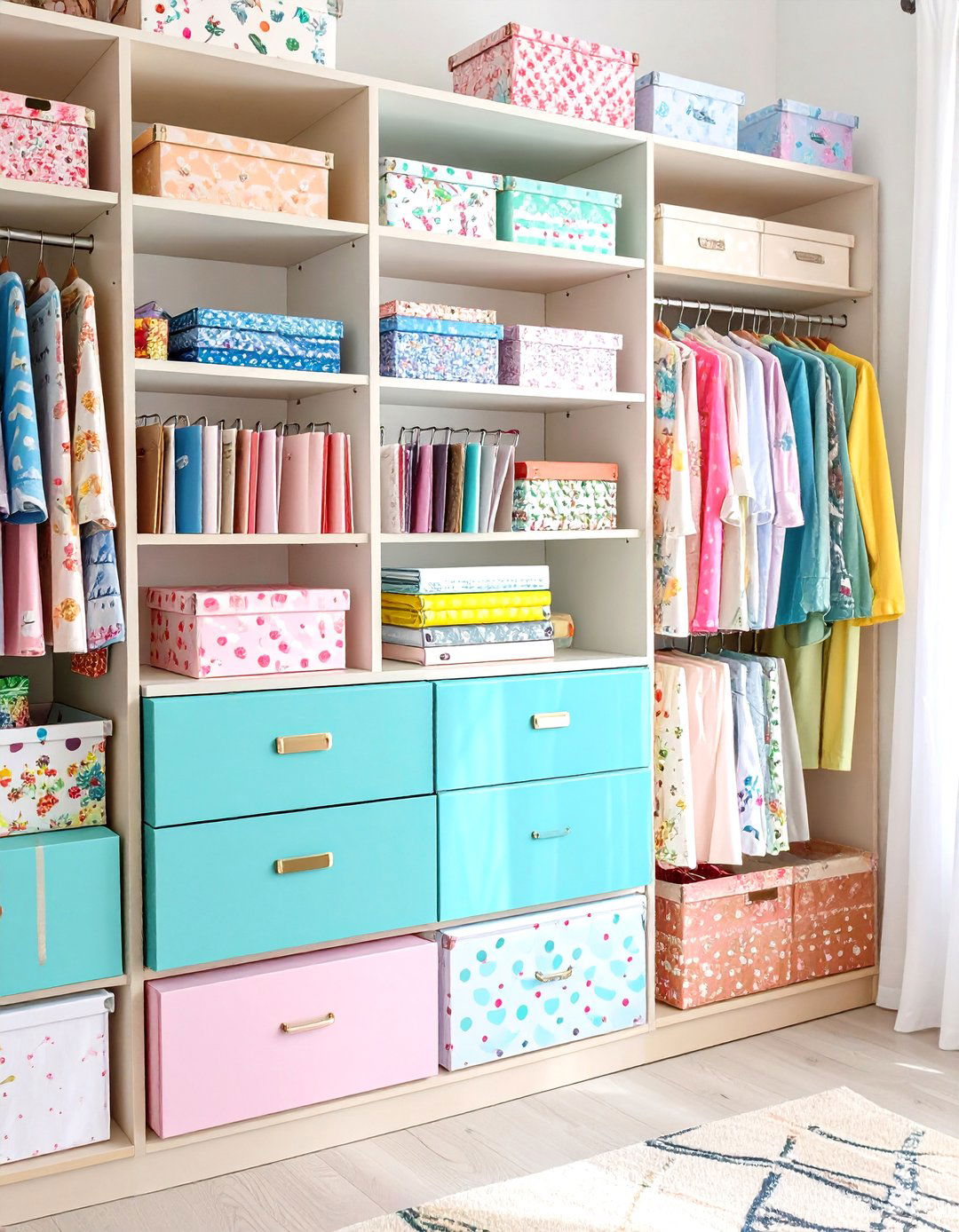
Why let paper patterns become crumpled disasters when organized systems keep them pristine? Effective pattern storage protects your investment while making pattern selection effortless. File folders in hanging systems work perfectly for uncut patterns organized by category or designer. Large flat drawers accommodate cut patterns in labeled envelopes with all pieces contained together. Magazine-style storage boxes keep patterns upright and visible like books on a shelf. Digital organization complements physical storage - photograph pattern envelopes and create searchable databases. Include modification notes and size information with stored patterns. Proper pattern storage extends pattern life while making it easy to find and reuse favorite designs for future projects.
17. Color-Coordinated Organization Systems
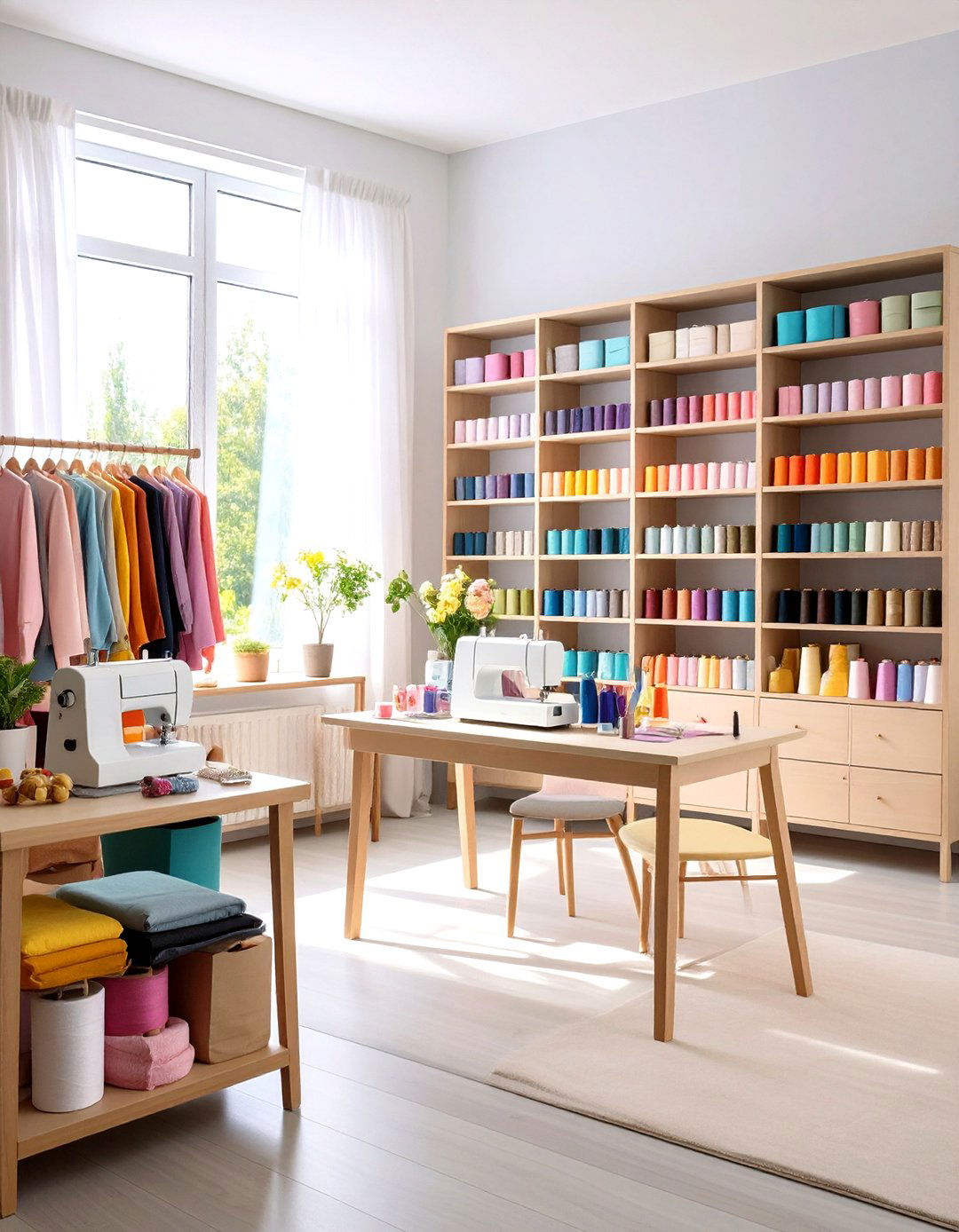
Does visual harmony in your sewing space inspire creativity and calm focus? Color-coordinated organization creates pleasing aesthetics while maintaining practical functionality. Choose storage containers and accessories in complementary color families that enhance your room's overall design. Organize supplies by color within storage systems - arrange thread displays in rainbow progressions or group fabrics by color families. Use consistent labeling systems with coordinated fonts and colors throughout the space. This approach creates visual cohesion that makes the space feel intentional and professional. Color coordination also helps with quick identification of supplies and maintains the organized appearance that encourages continued good habits and creative inspiration.
18. Window Seat Sewing Nooks
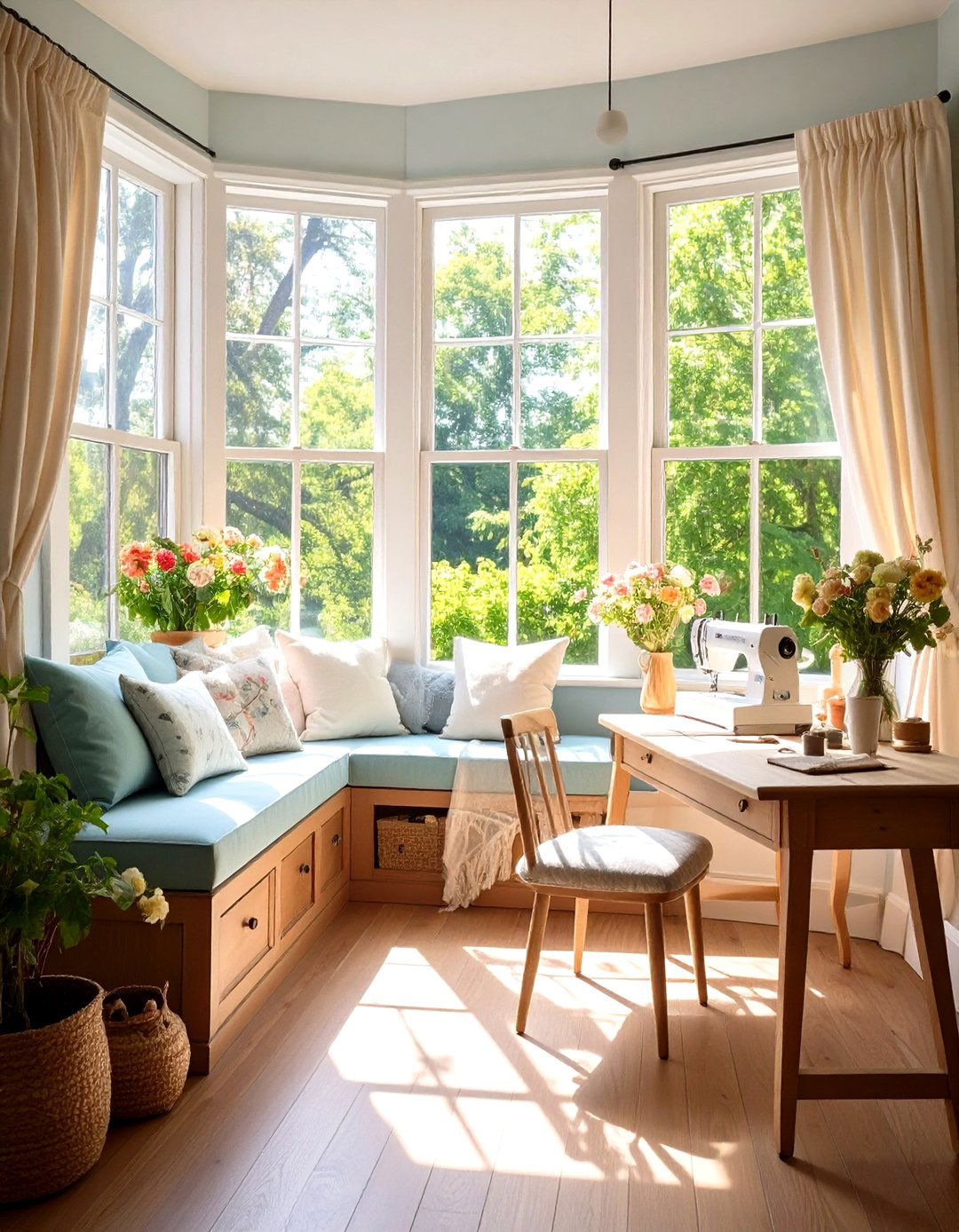
Could that sunny window become your favorite creative retreat with built-in storage? Window seat sewing nooks combine natural light with cozy workspace charm. Build or install a bench seat with lift-up storage underneath perfect for fabric or seasonal supplies. Position the seat at proper height for sewing machine work, with electrical outlets nearby for equipment. Add cushions and pillows for comfort during longer sessions. Install shelving or hanging storage on adjacent walls for supplies and tools. The natural light provides excellent illumination for detailed work while the contained space creates a focused environment. This arrangement works especially well in smaller homes where dedicated sewing rooms aren't possible.
19. Retractable Work Surface Extensions
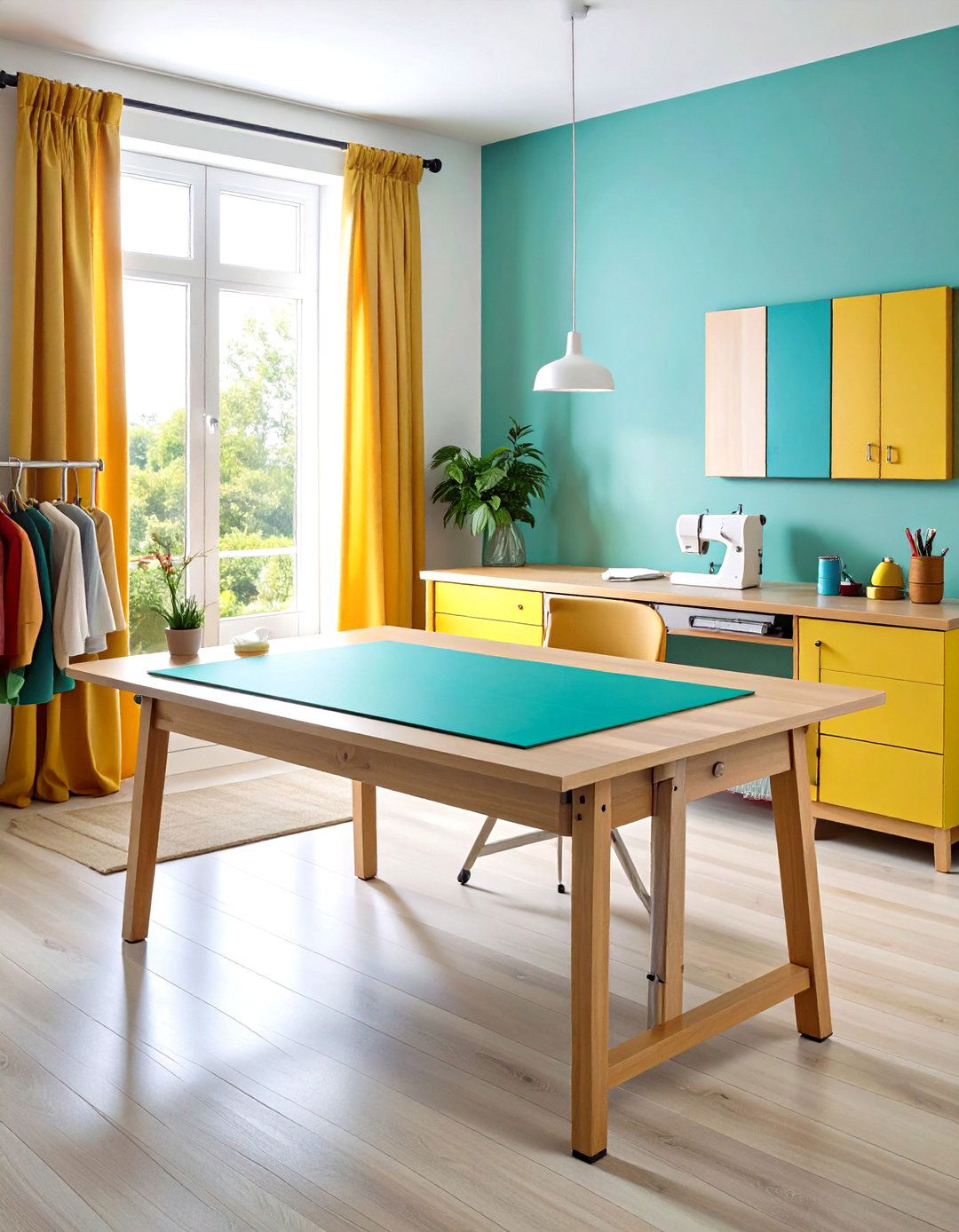
What if your workspace could expand for large projects then disappear when not needed? Retractable extensions provide valuable extra surface area without permanently consuming floor space. Install pull-out cutting extensions beneath existing tables that slide out for pattern layout then tuck away neatly. Wall-mounted drop-down surfaces work excellently in tight spaces, folding flat against the wall when not needed. Consider drawer-style extensions that pull out from cabinet bases to create instant work surfaces. These solutions work particularly well in shared spaces where sewing areas must occasionally return to other functions. Quality hardware ensures smooth operation and long-term durability for frequently used extension systems.
20. Inspiration Gallery Walls
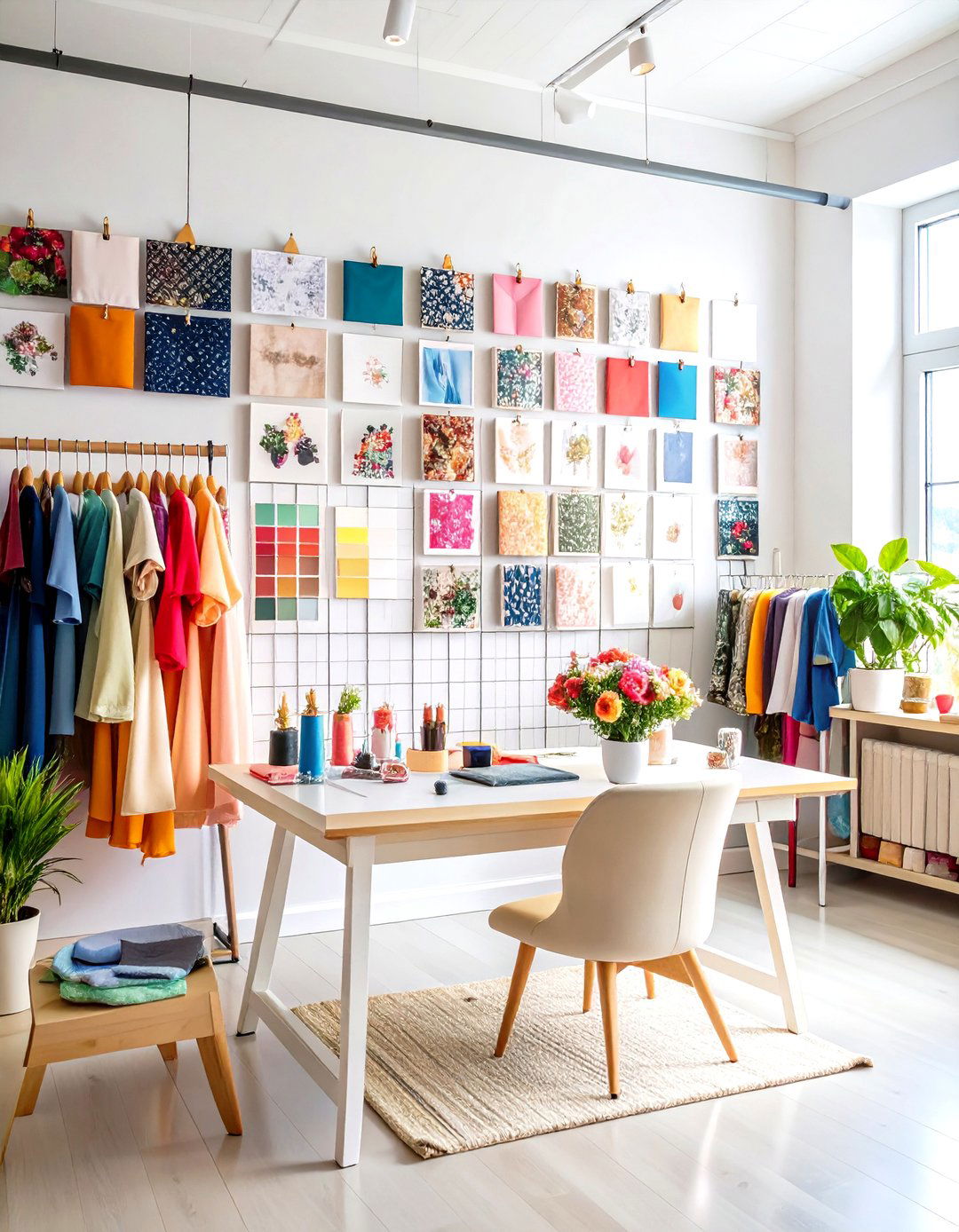
How do you keep creative motivation visible while maintaining organized workspace aesthetics? Inspiration galleries provide constant visual encouragement while showcasing your creative journey. Create rotating displays of favorite fabric swatches, color combinations, and technique samples. Frame completed project photos to celebrate accomplishments and remind yourself of successful techniques. Include magazine clippings, sketches, and color palettes that inspire future projects. Use bulletin boards or wire grid systems that allow easy updates as inspiration evolves. Position the gallery where you'll see it frequently during work sessions. This visual inspiration helps overcome creative blocks while documenting your growth as a sewist and providing reference for future project planning.
21. Temperature and Climate Control
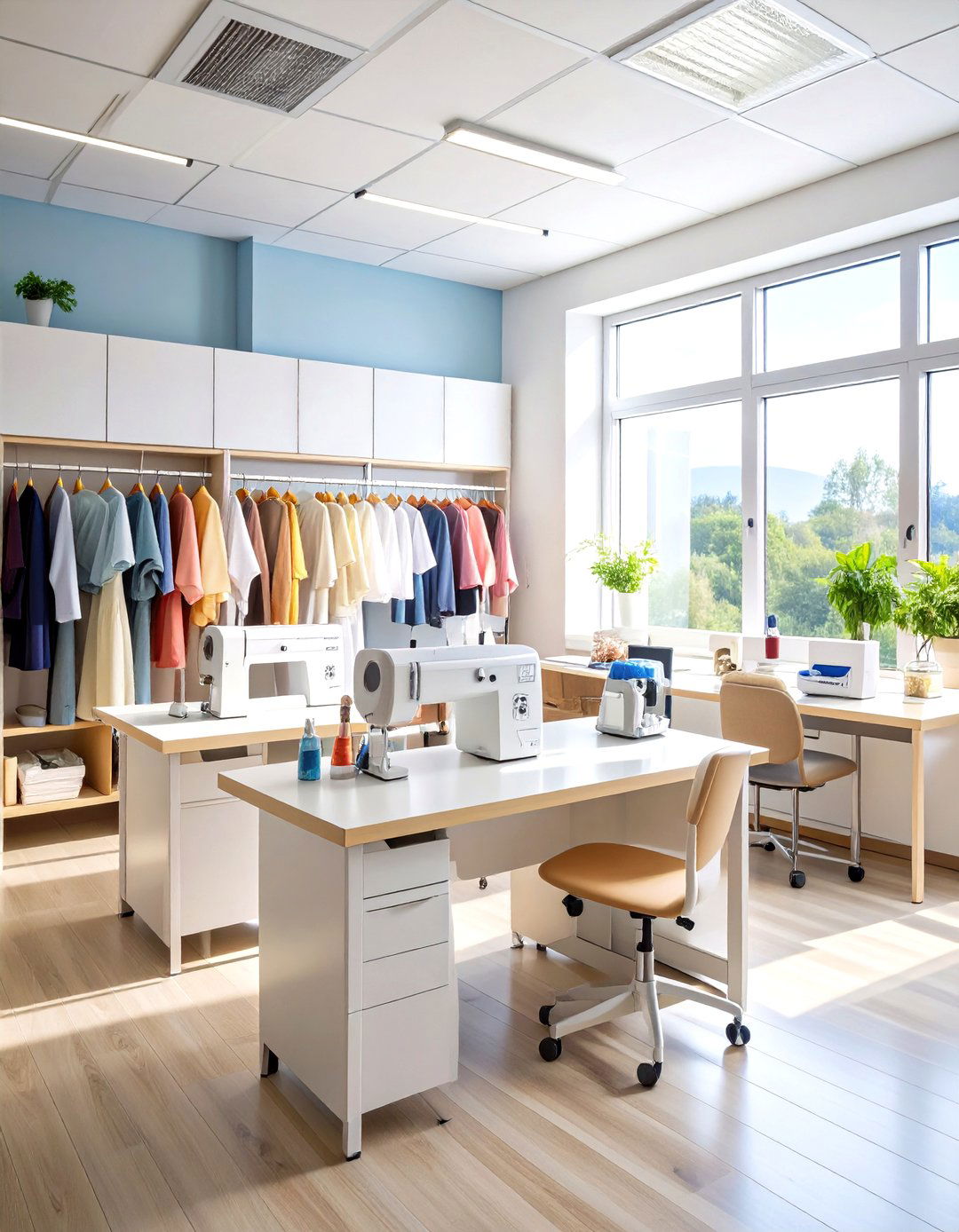
Are you protecting valuable fabrics and maintaining comfortable working conditions year-round? Proper climate control preserves fabric quality while ensuring comfortable sewing sessions. Install adequate heating and cooling systems that maintain consistent temperatures and humidity levels. Use dehumidifiers in damp climates to prevent mold and mildew on natural fibers. Ensure good air circulation to prevent stuffiness during long work sessions. Position storage away from direct heat sources that could damage fabrics or threads. Consider air purification systems that remove dust and allergens from the sewing environment. Comfortable temperature and air quality make extended sewing sessions more enjoyable while protecting your material investments from environmental damage.
22. Safety and First Aid Stations
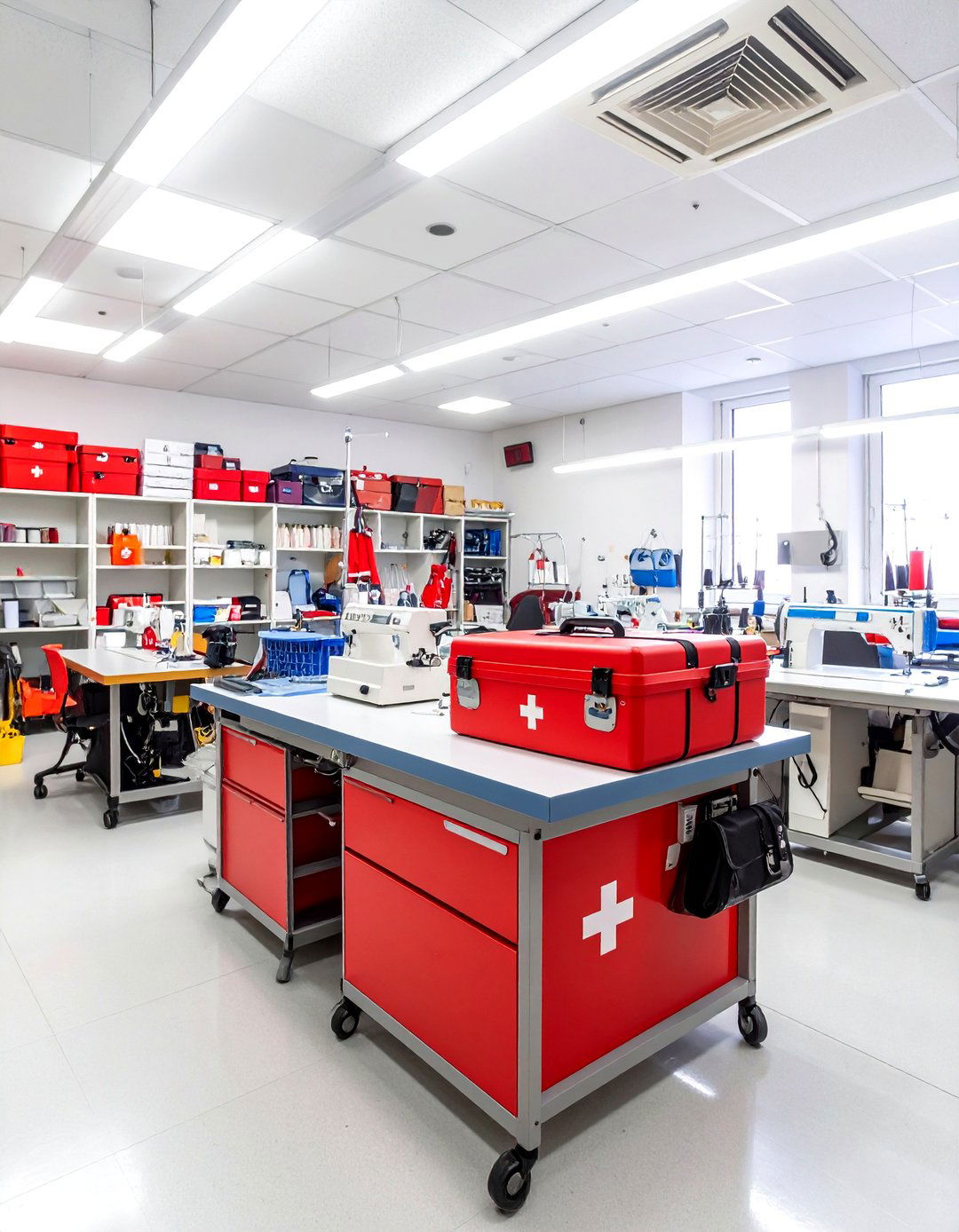
Why risk small accidents disrupting creative flow when prevention and preparation keep you sewing safely? Well-equipped safety stations provide peace of mind and quick response to minor mishaps. Keep a well-stocked first aid kit easily accessible for cuts, pricks, and minor burns from irons. Install adequate lighting to prevent eye strain and accidents. Maintain clear pathways free from fabric scraps and obstacles. Include fire safety equipment appropriate for electrical and fabric materials. Keep emergency contact information posted visibly. Good ergonomic practices prevent repetitive strain injuries that could end sewing careers. Safety consciousness allows you to focus on creativity rather than worry about potential hazards that proper preparation prevents.
23. Seasonal Storage Solutions
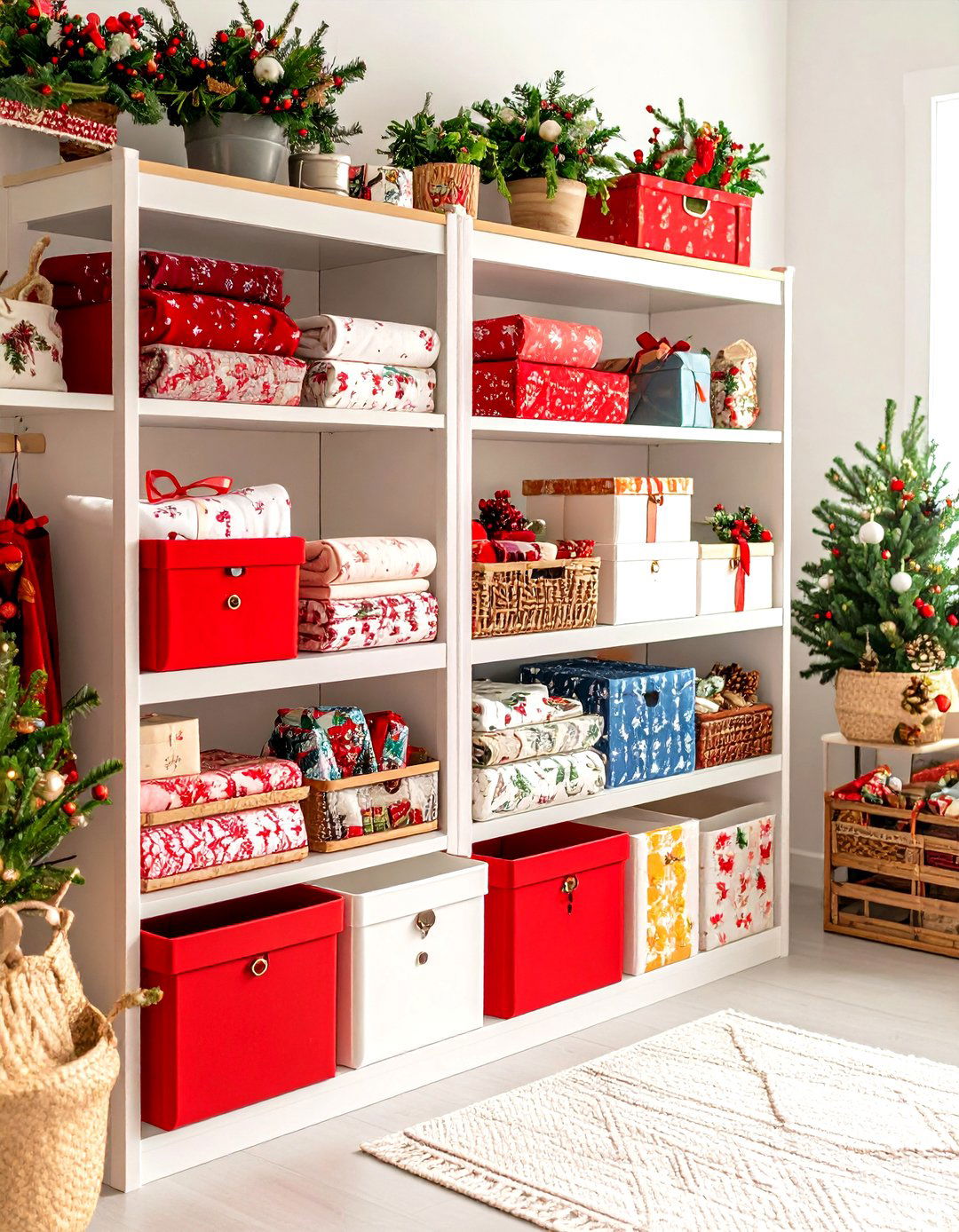
How do you accommodate holiday projects and seasonal fabrics without overwhelming your main workspace? Seasonal storage keeps special materials organized while maintaining year-round functionality. Use labeled bins for holiday-specific fabrics, patterns, and decorations stored in accessible but out-of-the-way locations. Rotate seasonal supplies to keep current projects front and center while storing off-season materials. Consider attic or basement storage for rarely used seasonal items with climate control considerations. Create inventory lists for seasonal storage containers to find specific items quickly. This organization system prevents seasonal projects from overwhelming daily sewing space while ensuring special materials remain accessible when holiday crafting season arrives.
24. Technology Integration Zones
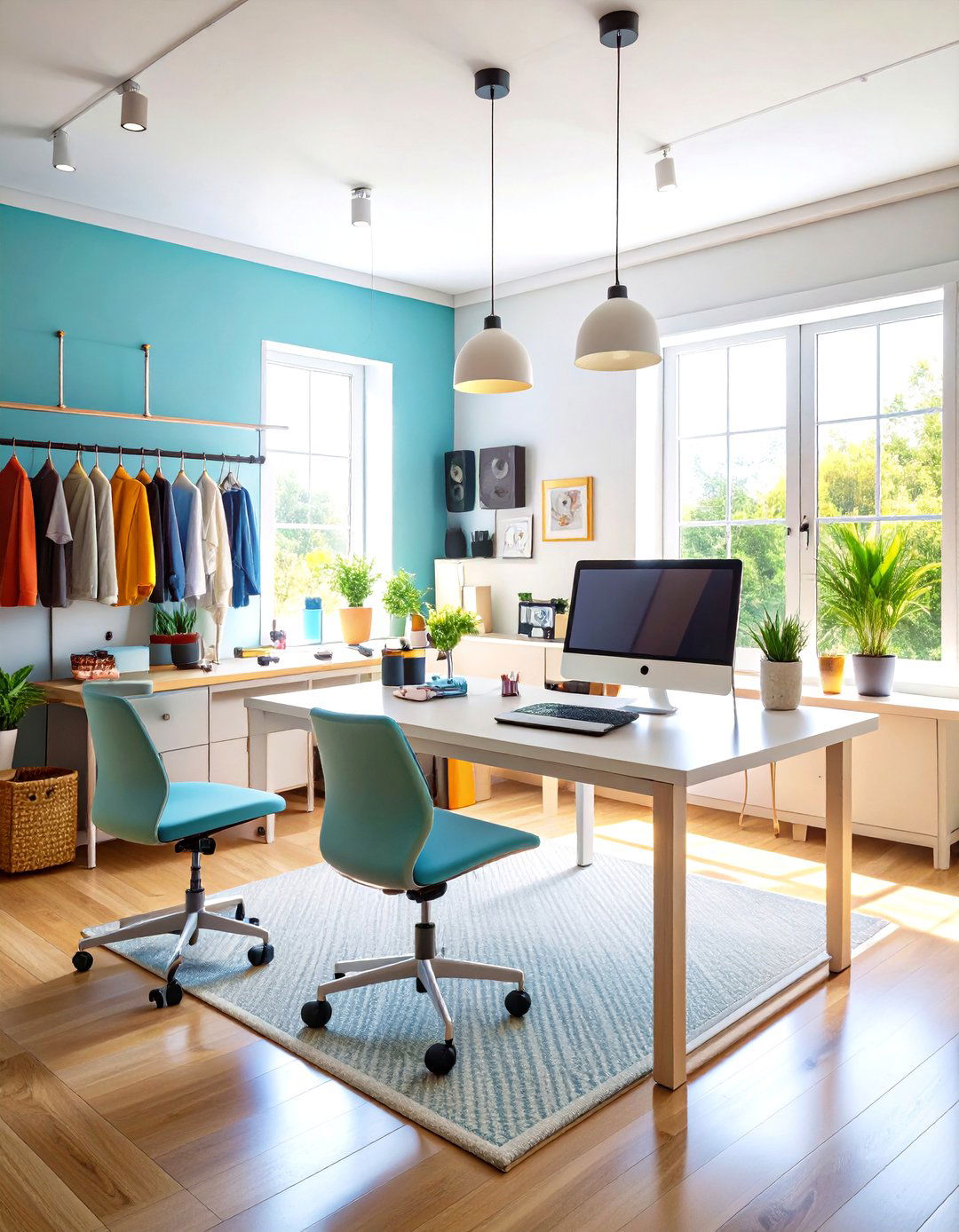
Could modern technology enhance your traditional sewing experience while maintaining creative authenticity? Technology integration adds functionality without overwhelming the creative process. Create charging stations for tablets and phones used for pattern instructions and inspiration browsing. Install speakers for background music that enhances focus and creativity. Consider computer workstations for pattern design, fabric ordering, and project documentation. Include good lighting for photography to document your work for sharing or portfolio purposes. Ensure adequate electrical outlets for multiple devices and sewing equipment. Technology should enhance rather than complicate your sewing experience, providing tools that support creativity while maintaining the tactile satisfaction that makes sewing so rewarding.
Conclusion:
Transforming your sewing space into an organized, inspiring haven requires thoughtful planning and creative solutions tailored to your specific needs and available space. The most successful sewing rooms combine efficient storage systems with comfortable work areas, proper lighting, and personal touches that spark creativity. Whether you implement one idea or incorporate multiple solutions, each improvement contributes to a more enjoyable and productive sewing experience. Remember that organization is an ongoing process that evolves with your skills and interests. Start with the changes that address your biggest challenges, then gradually build upon your foundation. Your perfectly organized sewing room awaits, ready to support countless hours of creative satisfaction and beautiful finished projects.





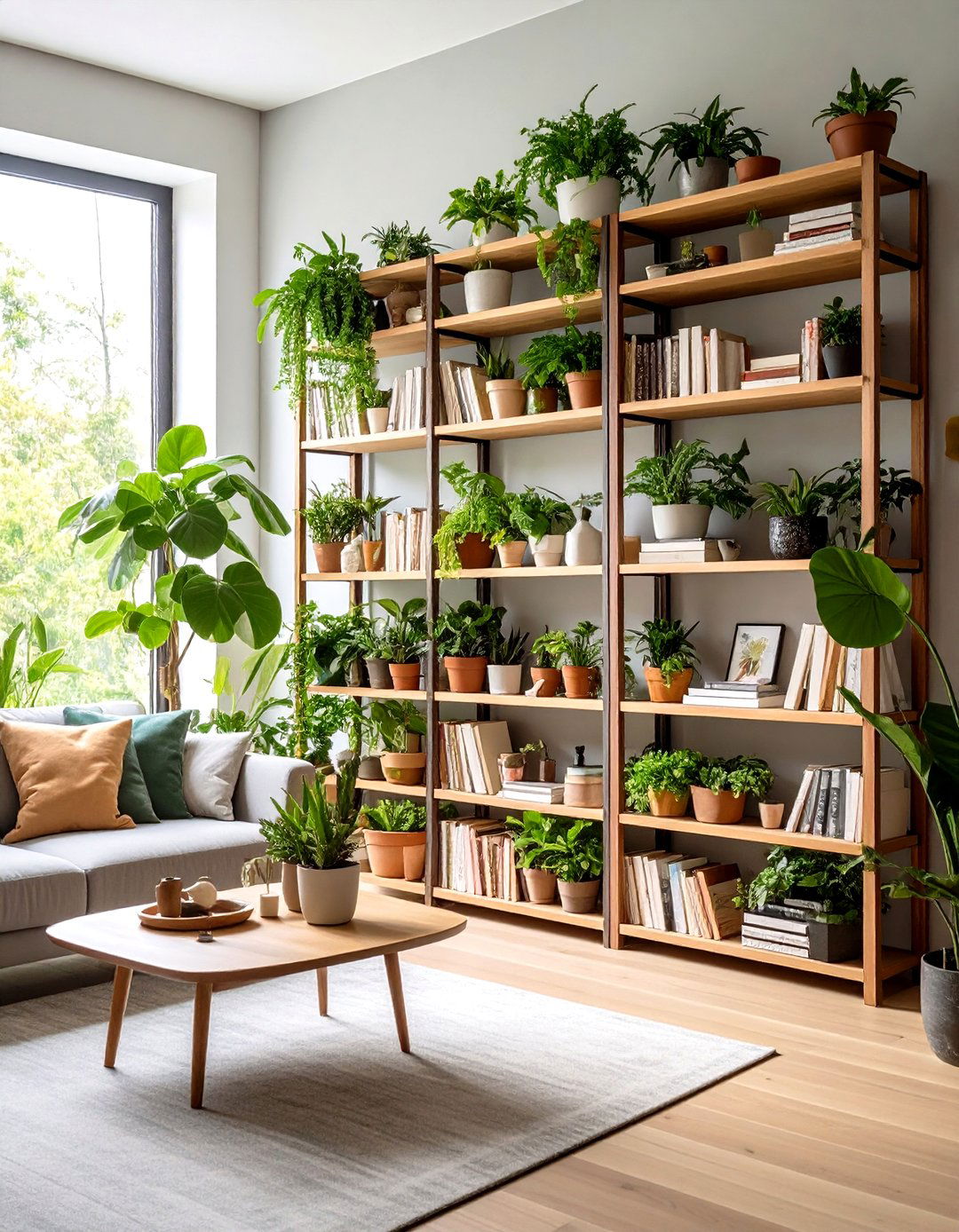

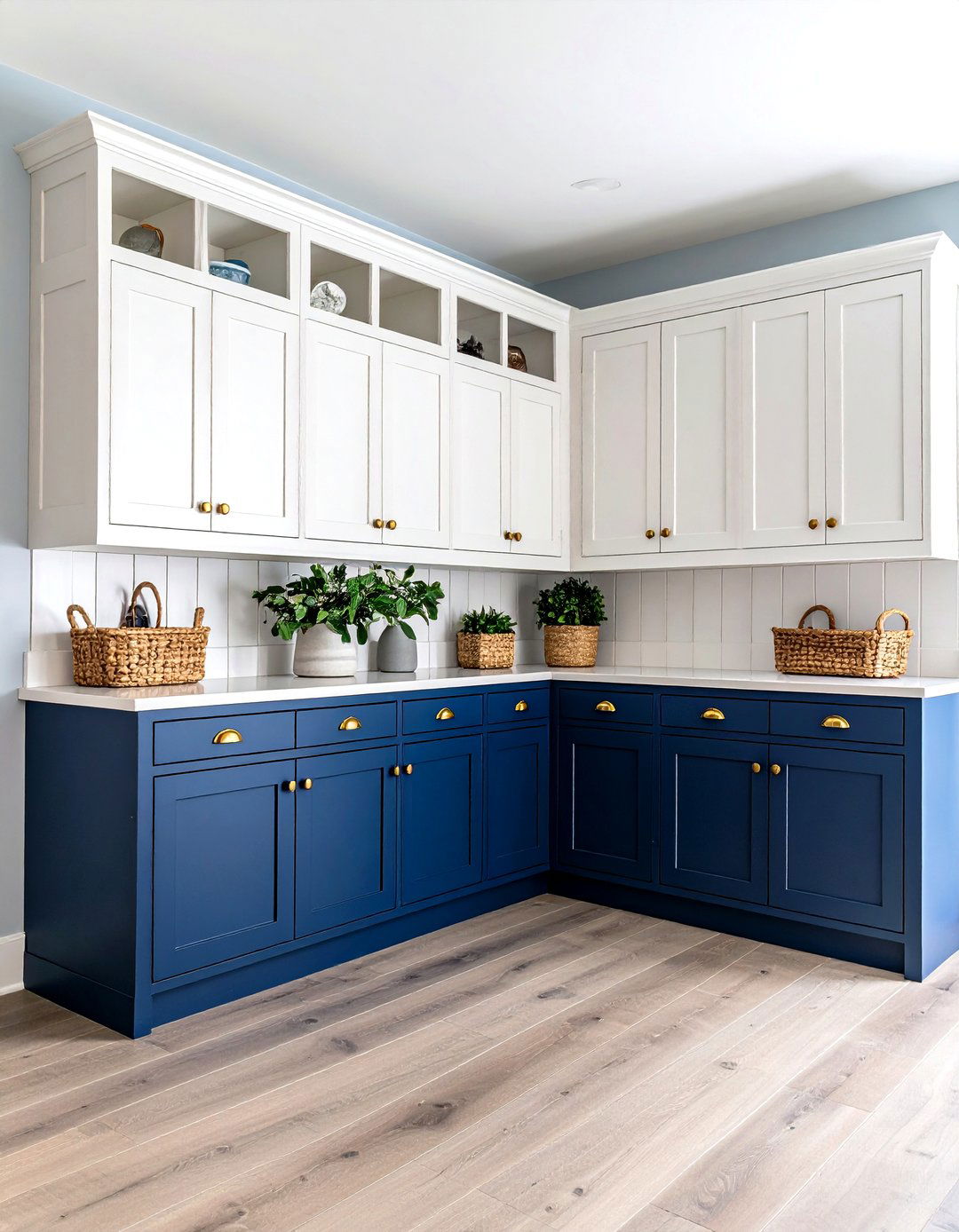
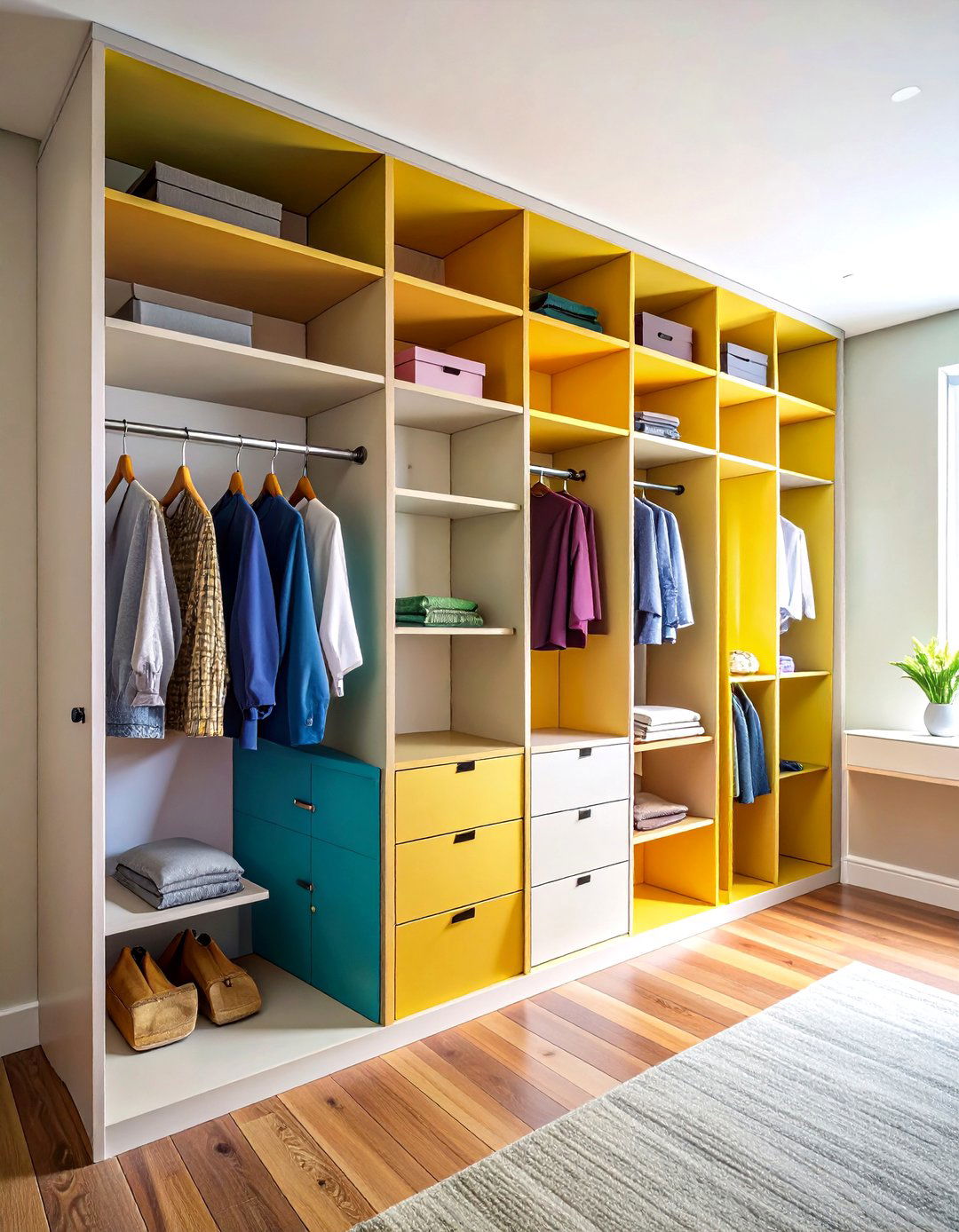
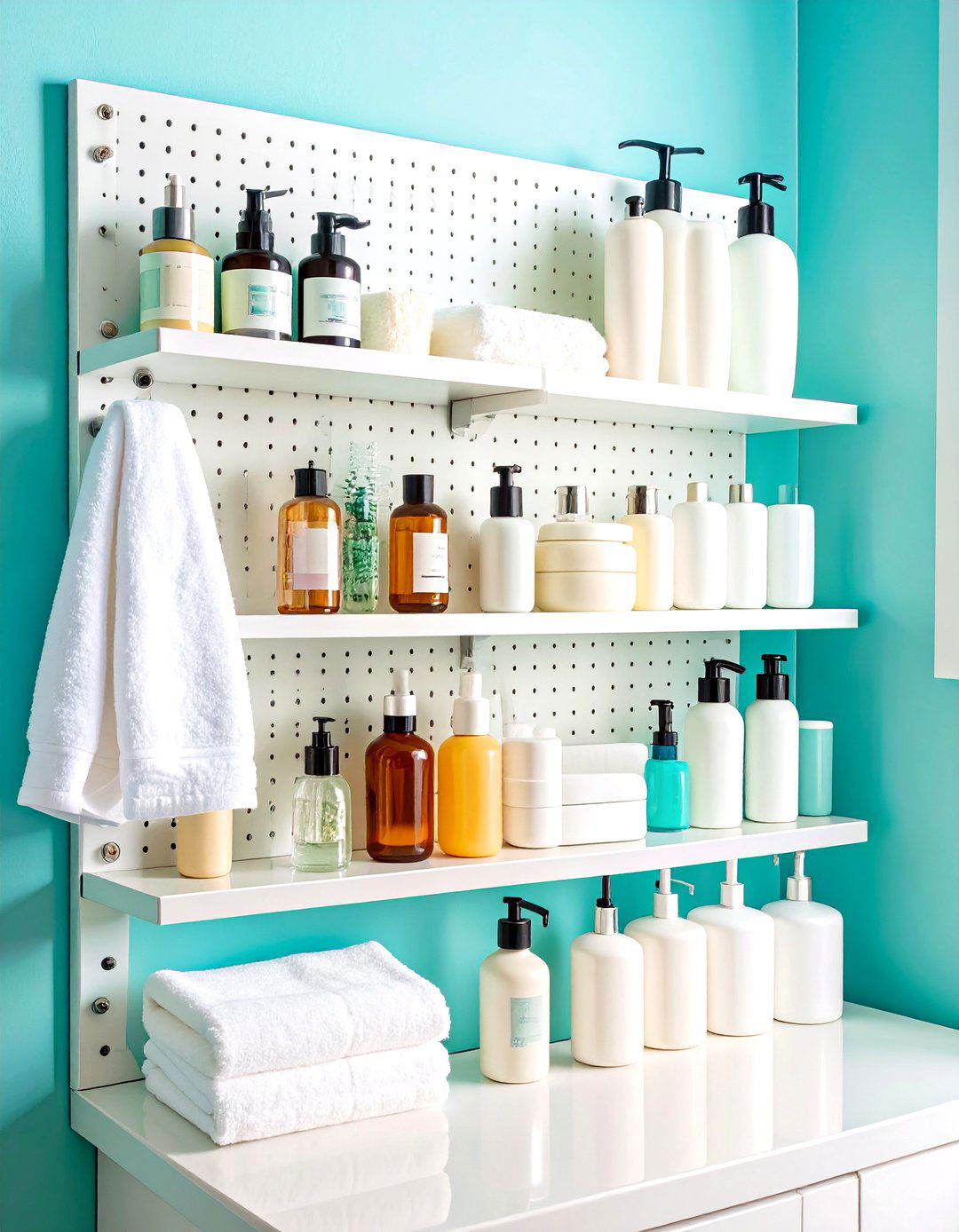

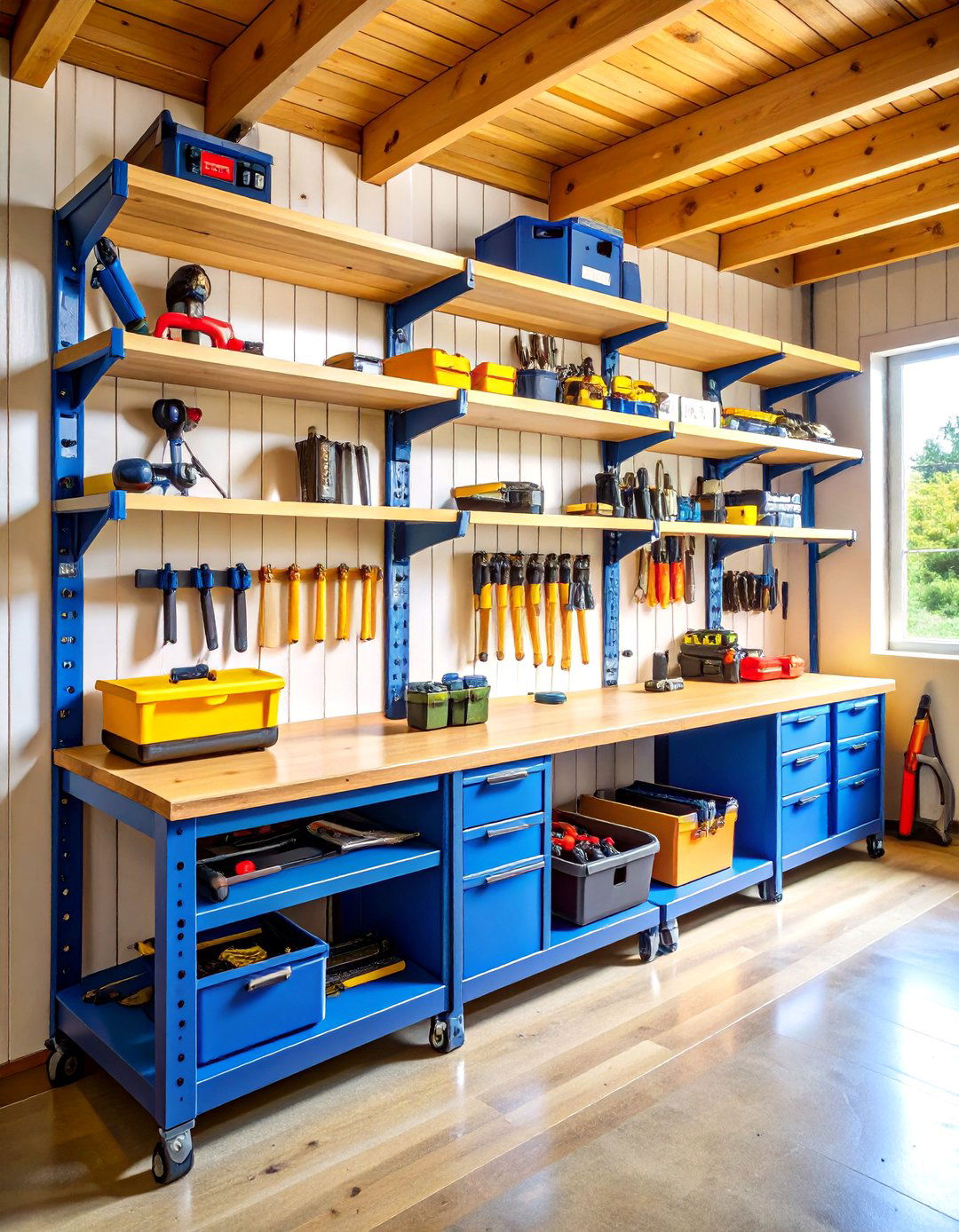
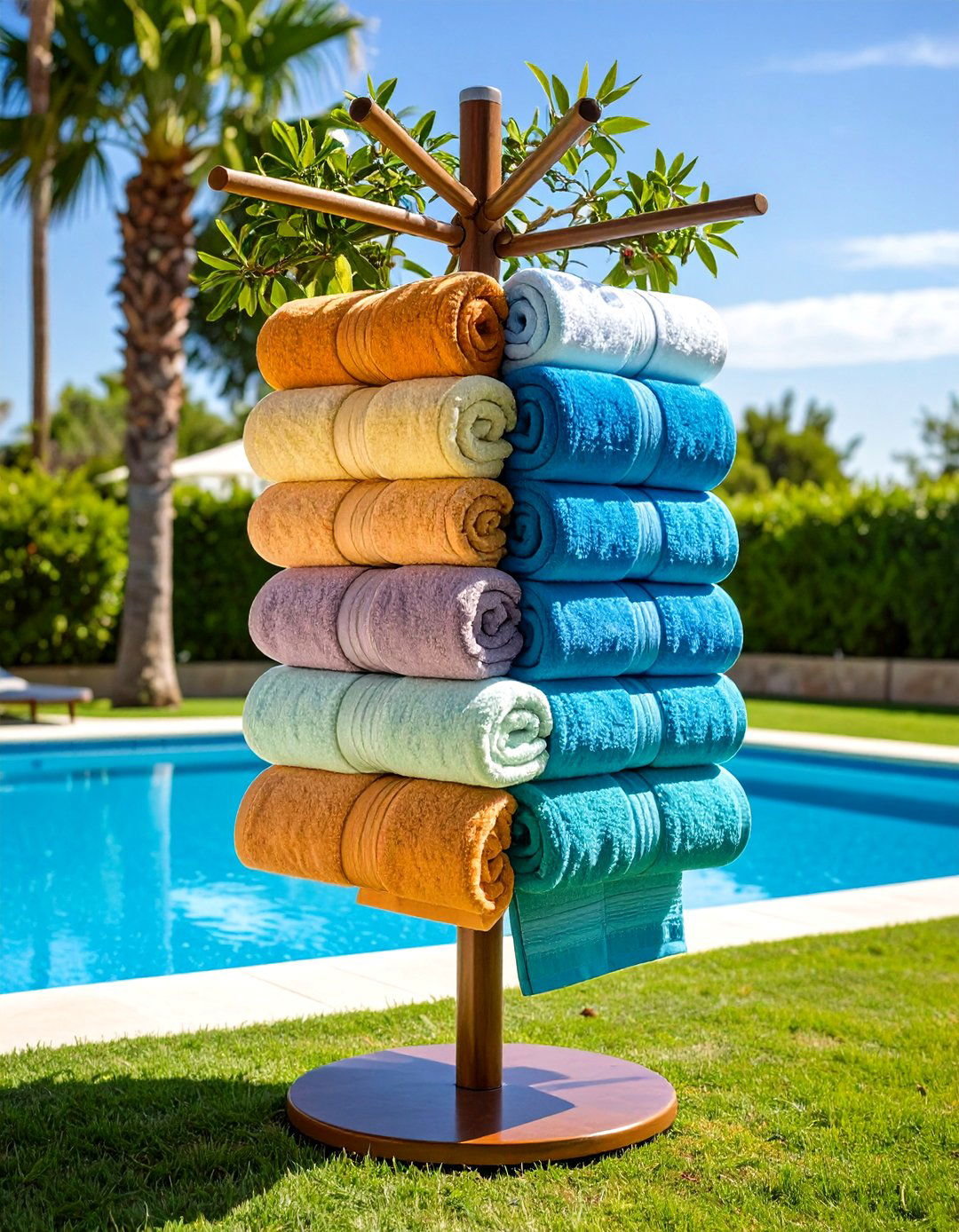
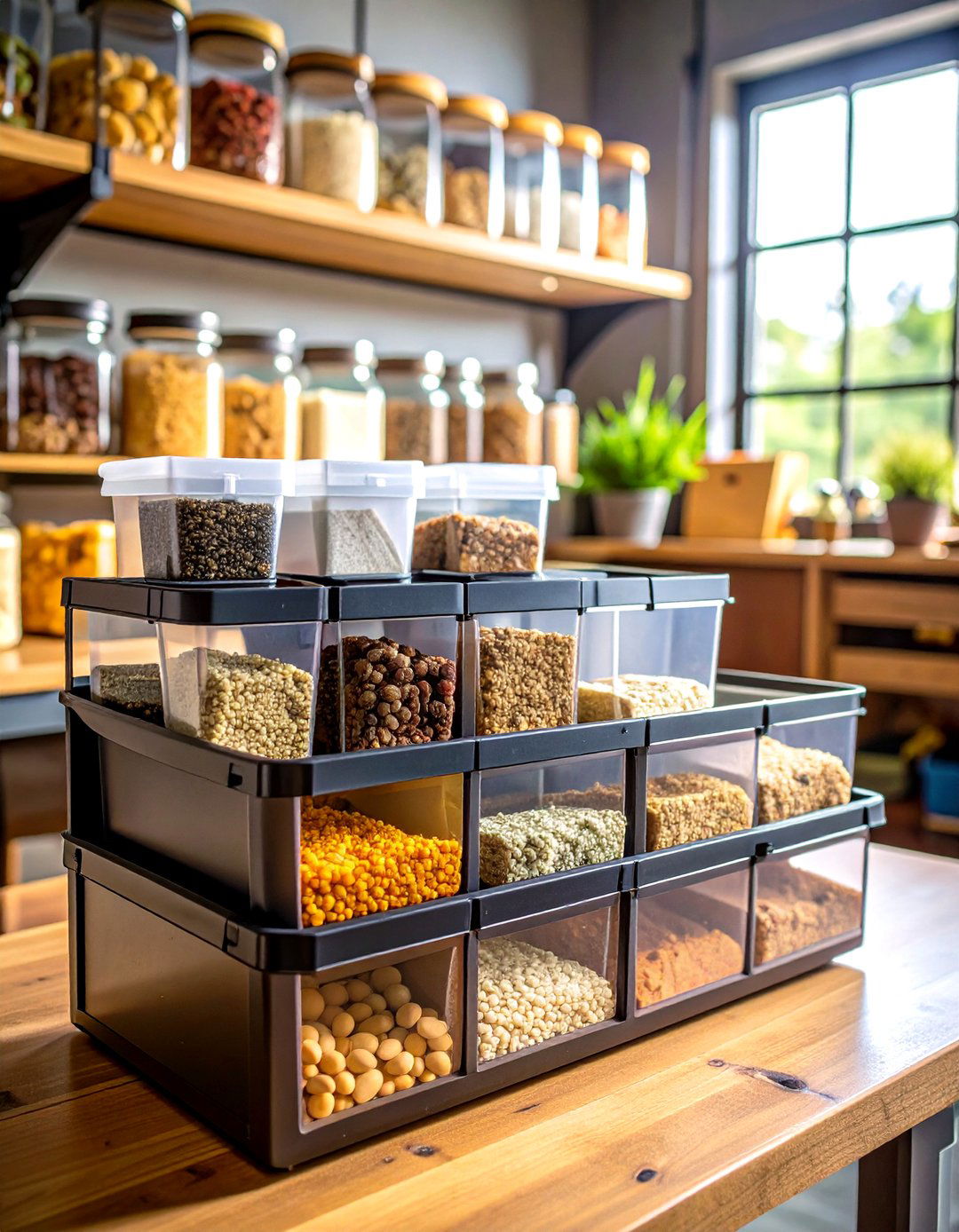
Leave a Reply